#like these could be great narrative stories for how one character starts with wanting to help those in need but becomes corrupted by his
Explore tagged Tumblr posts
Text
Intersectionality is something that, sadly, is often pushed to the side in Arcane discussions, specifically from a certain side of that fandom. They will go on and on about Viktor, as they usually do, talking about how he suffers from classicism and ableism within the show and fandom respectively (as they should as these are issues, but there is a catch when it comes to these fans as well), but when others in the fandom, especially Mel or even Sky fans, point out the racism and misogyny (misogynoir) that is often rampant in this fandom, particularly from said fans mentioned prior, all of a sudden its not possible or being overdramatized. Like they suddenly can't understand how some of their rhetoric includes or invites the same thing black fans have been calling out since the beginning, because how can you discuss the ableism and such that Viktor faces, but laugh or joke around with people who call Mel slurs or just denounce her to a trope? I thought you were for calling out forms of hate within fandom, or does your "activism" only stretch so far? And back to a previous statement, about the catch regarding those particularly fans----some of them regurgitate the same harmful rhetoric towards Viktor that they say they supposedly hate, just in mode subtle ways. How are you going to say you hate when Viktor is infantilized, but will be quick to forget he's a grown man who can defend himself (often when trying to pair him against Mel, framing her as the aggressor, and sometimes even Jayce too but to a lesser degree)? Not saying Jayce doesn't get equal amounts of hate, but his more so gets pushed aside along with his character to ultimately frame Viktor in higher regard, often making him ooc. It's like they pick and choose when the issues are prevalent, and when they aren't, and it's so frustrating.
#and it's so annoying to see as someone who for actually doesn't mind/kind of likes viktor as a character bc whenever i try to interact more#with him in fandom these types of fans make it so hard bc they overwhelm you with things that are so out of character that they practically#rewrite arcane to where viktor becomes overt stereotypes and looses what made him interesting to begin with#like you can hardly find analysis on his character at the end of s2 and how that is ACTUALLY SAD without getting the 3rd degree or see#j*yviks paint it as romantic#and it's very gross how they often frame viktor in this way to frame poc characters (like mel or jayce) as aggressors while ignoring how#everyone in arcane is flawed (including viktor) to different degrees and how characters can disagree without actually hating one another#(this is especially prevalent regarding melvik where people act like it can't happen bc mel “looked at viktor wrong”#but will be the same people to ship jayvik even though jayce was classicst as well....noticing)#but it's very weird how they only always talk about mel in regards to how she is around viktor & nothing else but complain about how mel#fans don't understand her---which is bs bc you'd be hard pressed to find many mel fans who don't write 1k thesis on her#heck some even say that the council bombing was justified even with mel being there!#and if they really want to go into detail about how mel's class and inaction impacts zaun fine go ahead but why stay silent#when people point out how she eventually changed and strived to help them or how viktor ended up causing more harm than good down the line?#like these could be great narrative stories for how one character starts with wanting to help those in need but becomes corrupted by his#own ambition and ends up becoming a bigger threat than what he and others like him suffered with before#but no it's easy for them to paint mel = bad and viktor = smol who can do no wrong#arcane#anti arcane fandom#arcane viktor#arcane mel#mel medarda#fandom criticism#fandom racism#fandom misogyny#also bc you can tell these people are on some bs bc they'll rave about how mel didn't care about zaun (which is untrue) but turn around and#say “but jayce-” like he wasn't causing zaun trouble as well#like im all for being critical about mel's complacency about zaun and all but don't act like jayce is any better#matter of fact why even try to do that? what purpose did it serve when there's literally proof against your point? hmm
22 notes
·
View notes
Text
you know what, I actually will talk about this because it's bothering me. The issue with focussing so heavily on syd and carmy's potential for a romantic relationship isn't that there's something inherently unintellectual about romance or whatever, it's that a lot of people seem incapable of doing that without immediately flattening the story and ignoring or intentionally misreading any and all nuance for the sake of that romance. Every scene suddenly becomes about how it impacts their relationship, every analysis is done through a romantic lens, every frame or line of dialogue becomes about finding some easter egg or hint that "proves" these people should start dating. Their dynamic is absolutely a fundamental part of this show, but if you can only see it as a will-they-won't-they, you miss so much of what the story is actually trying to say with these two.
There are good versions of this story where their relationship is romantic and there are good versions of this story where it isn't, but as soon as you decide them being together is "the point," you lose the ability to actually judge the story for what it is, not what you want it to be.
#like so much of their dynamic (esp but not exclusively in S3) has been about showing the ways that carmy's trauma and dysfunctional#attitude in the kitchen impacts other people and how even though he cares about syd and wants their partnership to work he keeps self#sabotaging and setting himself and by extension her and the restaurant up to fail and replicating the same toxic environments that#he grew up and trained in and this is very much consistent with his character and a natural continuation of the conflicts they've been#having since S1 but because him being shitty with her runs contrary to them getting together suddenly its 'ruining the story' and#out of character and only happening bc the writers just hate to see this ship winning and like. if you really think that i genuinely don't#know what show you've been watching bc it sure as shit wasn't this one. like it hurts to see him do this because you know#they could do something genuinely great together and that he's ruining a really good thing but this is also the reality of where he is rn#if he was just a good and supporting business partner and not deeply dysfunctional it would be wildly out of character#the problem w S3 wasn't that it 'ruined' their relationship it's that it had no clear focus overemphasized carmy's arc at the expense#of the other leads deprioritized the supporting cast while failing to give them their own arcs gave more screen time to#unecessary and uninteresting new 'comic relief' characters and let conflicts stagnate without resolving them or#letting them evolve over the course of the season.#this isn't exclusive to the bear this is a general trend ive noticed where as soon as the 'shipper' part of people's brains get activated#it's like they lose the ability to read the story any other way and it stops being about what's good for the narrative and starts being#about whether or not these two people kiss and anything that gets in the way of that is bad and anything that brings it closer is good#and it's usually whatever but it's really frustrating when the story ppl are doing that to is this good#it also makes people fundamentally incapable of treating any 'obstacle' to that romance in a way that isn't wildly meanspirited and#gross (esp bc those characters are usually women) which is exhausting. like no claire isn't evil or a 'pick me' or 'bad' for carmy#or a useless addition to the story or whatever other nonsense you guys have decided must be true to feel okay. she's a perfectly normal#character and their relationship is exploring some of the ways that carmy's inability to deal with or actually address his trauma#impacts the various relationships in his life. she doesn't even have to be a monster or a narrative mistake for him and syd to be#'destined' for each other or whatever. this isn't a middle school wattpad fic.#im definitely gonna get killed in the street for this but ive been looking for a good reason to spend less time on here so might as well#the bear#sydcarmy#sydney adamu#carmy berzatto
32 notes
·
View notes
Text
How to Describe Clothing in Writing
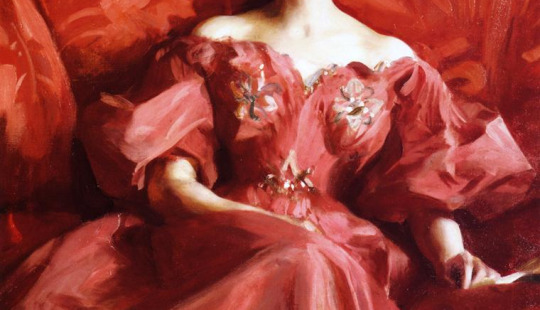
Creating vivid descriptions for a story or character is a mark of a great writer. One specific form of descriptive writing that particularly affects setting and characterization is the portrayal of characters’ clothing.
Writing Tips: Describing Clothes
Clothing descriptions work best when they appear organically in the course of the narrative. The story should never halt in place so that you can shoehorn in a bunch of sartorial descriptions. Here are some writing tips to help you use clothing descriptions in your creative writing:
Integrate clothing into your initial character description. The first time readers meet a character, they should get a sense of how they dress.
Study articles of clothing to make sure you know what they look like. This will help you choose the right words to describe them. For example, it would be appropriate to describe a chiffon dress as “sheer” or “thin,” but it would be clumsy to describe it as “threadbare” because chiffon is not cheap.
Pick outfits that fit the setting you’re writing about. If you’re describing an elegant ball, you might want to place a character in a form-fitting strapless evening gown, as this is a common piece for formal dances. Describing the clothing reinforces the setting you’ve chosen.
Blend clothing into job descriptions. If you’re describing a monk at work, you could note how the loose-fitting sleeves of his frock draped onto a table. If you’re describing a superhero in an action scene, describe the flow of their cape or the stiffness of their boots.
Let your characters change outfits. Show a character arc by marking how a character’s clothing changes over the course of your story. If a character in a YA novel starts out wearing ill-fitting khaki slacks with enormous pleats and ends that same novel wearing a denim jacket with an “anarchy” pin on the lapel, we know they’ve undergone some major changes.
Use clothing to set characters apart. Represent the difference between two characters by describing the differences in their clothing. Let’s say you’re describing two characters interviewing for the same job: One wears a sporty, ruched, A-line dress, and the other wears jeans and a sweatshirt. The reader can infer aspects of both characters’ personalities and make a comparison between two characters.
Reasons to Describe a Character’s Clothing
A character’s clothing is a window into so many aspects of their lives. From a character’s clothes, readers can make inferences about the following:
Clothing reveals a character’s personality. A knee-length fur coat and a corduroy jacket are both forms of outerwear, but it’s quite unlikely they’d be worn by the same kind of person. Readers can deduce a character’s style and personality from the clothes they wear.
Clothing implies a character’s wealth. Is your novel’s main character comes from a working-class background, it’s more likely they’d wear a t-shirt and jeans than a lavish and expensive piece of clothing. Just as in real life, clothing indicates status and wealth.
Clothing shows a character’s point of view toward the world. Clothing can reveal a character’s views on the world. If someone puts on a graphic t-shirt with the sleeves cut off, it implies that they could hardly care less about offending other people. Meanwhile, a character who wears a dressy button-down shirt with a single-breasted plaid jacket seems like the old-fashioned type. Maybe they’re heading to a mixer at the country club?
Clothing suggests the time and place in which a character exists. As part of your worldbuilding process, you’ll want to be as precise as possible about your book’s setting and time period. This doesn’t just apply to historical fiction; it applies to all forms of writing. For instance, if you’re writing a battle scene set during the Revolutionary War, you might need to study the physical descriptions of britches and pantaloons. But if your scene is set in a present-day battlefield, you might describe a soldier as wearing camouflage with a tag hung from a necklace. Simply by changing the clothing description, you’ve marked a massive distinction between these two war stories.
Source ⚜ More: Notes ⚜ Writing Resources PDFs ⚜ References: Fashion
#description#clothes#writing notes#fashion#writeblr#literature#writers on tumblr#dark academia#writing reference#spilled ink#writing prompt#creative writing#writing tips#writing advice#on writing#writing inspiration#writing ideas#alfred stevens#writing resources
843 notes
·
View notes
Text
when it comes to the umbrella academy, a lot of people seem to think that the first half is great and the second half is terrible. personally, I think only the first *season* is great, or even good. here's why:
the mission statement at the end of season 1 is fixing viktor, but viktor isn't the only broken one, so you can infer that they're all going to have to fix *each other* - as a family, the one thing their abuser never let them be. and the world's burning down around them because of the most dramatic sibling confrontation to ever grace the earth, but they're holding hands and escaping together and surviving the impossible with the intent to move forward, even if that means momentarily moving backwards. it's a masterful allegory for finally growing up, accepting responsibility for your personal trauma and tragedy and how they shaped you, and the moment you take that power back by choosing to heal your inner child, only after being slapped in the face with the fact that if you don't, it *will* destroy everything you've ever built, ever cared about, and ever could.
and then the rest of the show forgets all of it. as it were, it goes in the *exact opposite direction.*
on the surface, the second season isn't *as* bad as the subsequent ones are. but season 3 and 4's faults can be traced back to season 2 by how it pivoted away from the serious subject matter that the story (not the plot - the *story*) was heavily baked in, leaning hard into the goofier elements instead, without ever understanding the contrast that those conflicting elements served to highlight. it made them both more powerful; the jokes were funnier because you were just devastated, and the trauma was more devastating because you were just in tears laughing. the emotional roller coaster is key to understanding these people, and you *have* to take the serious stuff seriously for it to work. at least half of the show doesn't, and as a result, the emotional moments feel hollow.
controversial opinion: as a character, luther is better in season 1 than he is anywhere else. he's more unlikable, but that's because he's implicitly there to show what *not* to do - even if he'd succeeded narratively by locking viktor up and saving the world, he still failed thematically by emulating their father and continuing the cycle of abuse - so luther's a character that's being very effectively used to add to the core theme of the story. he feels like a real, frustrating person, whose brain chemistry got messed up by years of abuse and isolation, all for the crime of thinking his father loved him and wanted the best for him. not like a made up guy on your screen doing silly stuff solely for your entertainment.
season 2 was also the start of the characters getting love interests instead of storylines, which season 1 never would have *dreamed* of; klaus and dave's tragic romance only served to further klaus's character arc, viktor's creepy boyfriend was actually manipulating him the whole time, five's fractured-psyche-mannequin was a narrative tool to let us see into the head of such an emotionally reticent character, and so on. the romance served the character, but fairly quickly into the show's progression, it felt like the character started serving the romance. five was immune to this curse for a long time due to aidan gallagher's age, which is why he's (for the most part) the best, most consistent character across the show, because they had to use their *imagination* for him and actually *write an arc* instead of falling back on tired romance tropes that any selection of characters could slot into to fill the dead space.
after season 1, the umbrella academy is entertaining, but it doesn't have anything to *say.* which is extremely disappointing when the show initially made such a strong case for what it wanted to be.
653 notes
·
View notes
Text
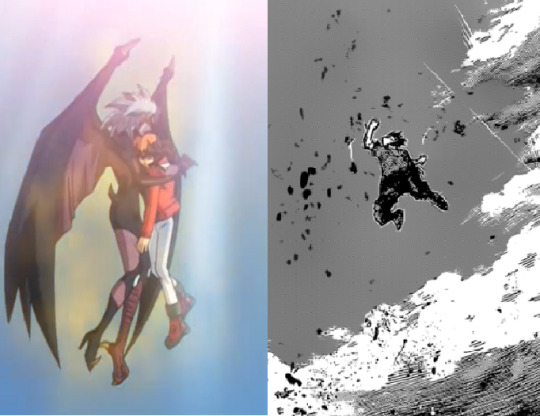
SHIGARAKI VS. YUBEL: HOW TO SAVE YOUR VILLAIN
The failure of Deku to save Shigaraki isn’t just a tragic conclusion for Shigaraki’s arc, it’s also My Hero Academia failing as a story. When I say the story failed, I mean the story has failed to answer any of the questions it asked its audience. It’s themes, character arcs, everything that communicates the meaning of the story to the audience is no longer clear.
Saving Shigaraki was the central goal of not only the story itself, but the main character Deku. By failing in its goal you can’t call this a good ending. In order to illustrate why this goal of saving the villain is so important to both Deku’s character and the central idea of MHA, I’m going to provide a positive example in Yu-Gi-Oh GX were the main character Judai successfully saves their villain. One of these stories fails, and the other succeeds. I will illustrate why under the cut.
BROKEN THEMES = BROKEN STORY
When artists draw they have to consider things like perspective, anatomy, shading, light, coloring. Drawing has rules, and it’s hard to produce good art without knowing these rules beforehand. If I draw something that has bad anatomy, you can criticize me for that.
Writing has rules, just like drawing. The rules of storytelling are important because writing is an act of communication. You can write whatever you want, just like how you can draw whatever you want, but if you break the rules the audience won’t understand what you are trying to communicate.
When I refer to MHA as a broken story, I am referring to the fact that it has broken the rules of storytelling. As this youtuber explains.
“I guess we should first define what broke and broken even means in this context. Has the story turned into an unintelligible mess? Not really. Value judgements aside, the narrative is still functional and fulfills the criteria of being a story. So how can a story that still functions be broken? Maybe to you it cannot. But to me a story that is still functional isn’t enough. What I mean when I say MHA is broken is that it’s lost something crucial. A codifying style of structure, pacing and payoff that until a certain point was the core of its identity.”
I could launch into a long-winded explanation of what themes are, but for the sake of simplicity I like to define themes in terms of “Ask, and answer.” The author asks a question to the audience, and then by the end of the story provides an answer. The audience is also invited to come up with their own answer which prompts them to think about the story on a deeper level. The question both MHA and GX are asking both its main characters and the audience is “Can you save the villain?” with the additional complicated question of “Should you save the villain?” This post will detail how both stories go about answering those two questions, and more importantly why those answers matter for the story.
With Great Power… You know the rest.
My Hero Academia and Yu-Gi-Oh Gx are actually similar stories once you get past their superficial differences. MHA is a story with way better worldbuilding, compared to a society where everything revolves around the trading card game, and people go to school to be better at a trading card game.
However, if you get past that. They are both bildungsroman, stories about the main characters growing up into adults. They both have an academy setting where the goal is for the main character to graduate and enter the adult world. They are both shonen manga. GX is the sequel of Yu-Gi-Oh a manga that ran in Shonen Jump the exact same magazine as MHA. The biggest point of comparison is their main characters, who both start out as young and naive who are driven by their admiration of heroes. Deku is a fan of All Might who wants to become a hero despite not having a quirk, because he loves All might who saves everyone with a smile. Judai’s entire deck archetype revolves around “Elemental Heroes’ and later “Neo-Spacians” who are all based on popular sentai heroes like ultraman.
The central arc for both characters is to grow up. Growing up for both of them not only requires figuring out what kind of adult they want to be, but also what kind of hero they want to be.
Now I’m going to drastically oversimplify what a character arc is.
A character arc first starts out with the character being wrong. Being wrong is essential because if the character is right from the beginning, then there’s no point in telling the story. A character often holds the wrong idea about the world, or has some sort of flaw that hinders their growth. The narrative then needs to challenge them on that flaw. It usually sets up some kind of goal or win condition. That flaw gets in the way of a character “winning” or achieving their goal, so they need to fix that flaw first. If their ideals are wrong, then they need to think about what the right ideals are. If they’re too childish, they need to grow up. If they have unhealthy behaviors or coping mechanisms, they need to unlearn it and require better ones. Otherwise, that flaw will keep sabotaging them until the end.
I’m borrowing the word “win condition” from class1akids here because it’s an incredibly appropriate terminology. Midoriya needs to do “x” in order to win, otherwise this victory doesn’t feel earned. The “x” in this case is usually character development. As I said before, a story where the main character hasn’t changed from beginning to end feels pointless. Especially in Deku’s case, he was already a brave, strong hero who would charge right into battle and defeat the bad guys in chapter one, so him defeating Shigaraki in a fist fight doesn’t represent a change.
The story sets up not only “What does the hero need to do to win?” but also “How does the hero need to change in order to win?” A character either meets these requirements before the end of the story, or they don’t and usually this results in a negative ending.
MHA in its first half quite clearly set up both the final conflict of saving the villains, and also that saving the villains is its “win conditions.” The hero shouldn't be allowed to win without first fixing this flaw.
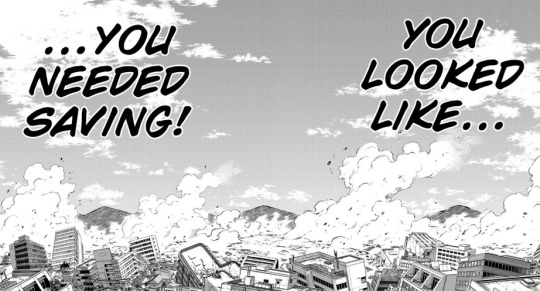
From this panel onward the central question Deku is forced to answer shifts from “Am I strong enough to defeat ShigarakI” to “Can I save Shigaraki?” However, much earlier than that All Might goes on to basically set up the win conditions of what makes the ultimate hero as someone who “Saves by winning, and wins by saving.”
All might: You can become the ultimate heroes. Ones who save by winning, and win by saving.
Therefore the story has set it’s criteria for what kind of hero Deku needs to become. If he wins without saving, then he’s failed to become what the series has set up as the Ultimate Hero.
Shigaraki and Yubel aren’t just narrative obstacles, or boss monsters to be killed like in a video game. They are narrative challenges, which means that the character can’t grow in any way if they don’t answer the challenge presented by the characters. They are villains who actively resist being saved, to provide a challenge for two heroes who define their heroism by saving others. The challenge they pose adds a third question to the story and the main characters.
"Can I save the villain?"
"Should I save the villain?"
"If I don't save the villain, then can I really call myself a hero?"
In other words the decision they make in saving, or not saving their final antagonist defines what kind of hero they are. In Deku’s case it’s even more critical he defines what hero he wants to be because the MHA is also a generational story, and several of the kids are asked to prove how exactly this generation of heroes is going to surpass the last one. The kids growing physically stronger than the last generation isn’t a satisfactory answer, Deku getting strong enough to punch Shigaraki hard is not a satisfactory answer, because we are reading a story and not watching a boxing match.
I’m going to focus on the last two questions though for a moment. Many people who argue against saving villains like Shigaraki argue he is a mass murderer and therefore isn’t worthy of salvation. However, the act of saving Shigaraki isn’t a reflection of Shigaraki himself, but rather the kind of hero Deku wants to be. It all boils down to Spiderman. In the opening issue of Spiderman, teenage Peter Parker is bitten by a radioactive spider and suddenly gains super strength, the ability to stick to walls along with other powers. However, being a teenager he uses these powers selfishly at first. He doesn’t feel the obligation to use his powers for other people, and therefore when he sees a robbery happening right in front of him he lets the robber go. However, because he lets the robber go, the robber then attempts to hijack a car and kills his Uncle Ben in the process. If Spiderman had stopped the robber then he might have prevented that from happening. He had the power to stop the robber, but he didn’t feel responsible or obligated to save other people. As a result Uncle Ben dies. It’s not enough to have power, ti’s how you use that power that reflects who you are, therefore: “with great power comes great responsibility.”
The choice to save Shigaraki actually has little to do with whether or not Shigaraki is redeemable, but rather how Deku chooses to use his power, and what he thinks he is responsible for reflects who Deku is as a person. Deku himself also clearly outlines how he wants to use his power, that One for All is a power for saving, and not killing.
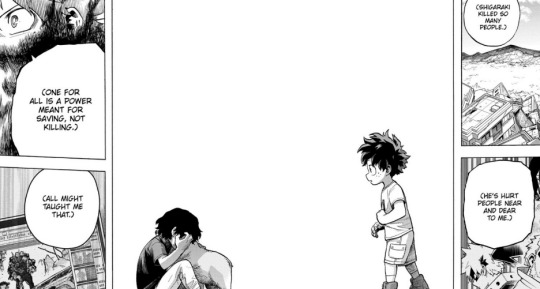
How he uses his power reflects Deku’s ideal in saving others, and therefore if he doesnt use his power to save, then he’s failed to live up to his ideals. It's not whether it's morally right to save a murderer like Shigaraki, but rather the way Deku wants to choose to use his power. It's about whether he feels the responsibility to save others.
Judai explores an incredibly similar arc to Deku. They are basically both asked what kind of responsibilities a hero is supposed to have, which is also a metaphor for growing up to handle the responsibilities of adulthood. As both characters start out with incredibly naive and childish ideas about what a hero is. Therefore realizing what a hero is responsible for is key to them growing as a character. However, Judai is different from Deku. In some ways he’s more like Bakugo. Judai is a prodigy who’s naturally good at dueling. He doesn’t duel to save others, but rather because duels are fun and he’s good at it. He’s very much like Bakugo, who admired All Might as a hero just as much as Deku did, but admired the fact that he was strong and always won rather than he saved others.
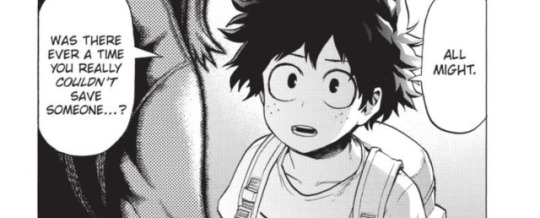
However, I would say both Deku and Judai are questioning what a hero is responsible for. They are both asking if they have the responsibility to use their power to save others. If they have to fight for other people, just because they have power. His first big challenge as a character comes from Edo Phoenix, who calls out Judai for not thinking through what it means to be a hero, and what responsibilities heroes carry. Judai duels because he thinks it’s fun. He will show up to duel to help his friends, but that’s because he’s the most powerful person in the group. Even then it’s because he finds fighting strong opponents to be enjoyable. Bakugo will beat up a villain, but for him it’s more about winning then if the action will save someone or not.
Judai is more often than not pushed into the role of being a hero, he doesn’t play the hero because he’s a particularly selfless person, and he’ll often avoid responsibility if not forced. He has power but no sense of responsibility and the narrative calls them out as a problem.
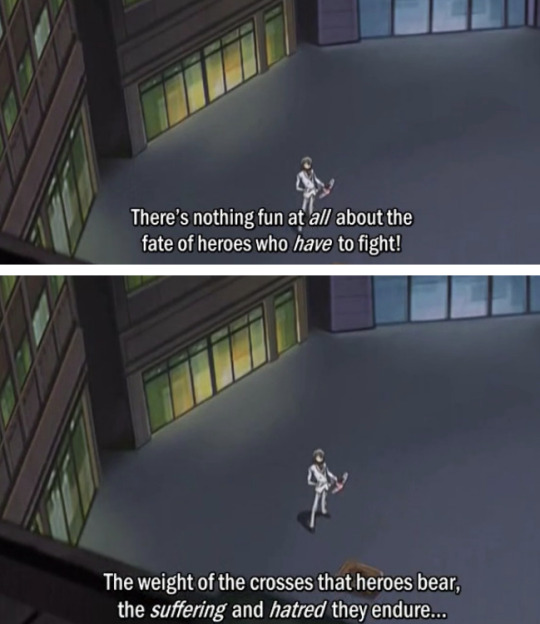
Edo: Can you even fathom that, Judai?
For Judai, he can’t understand the responsibility of being a hero. For Deku, he idealizes heroes so much he can’t understand that there are people out there the heroes have failed to save. These two callouts towards Deku and Judai are discussing similar because they’re both discussing where a hero’s responsibilities lie. Is a hero responsible for saving everyone? Is someone strong like Judai responsible for using their strength to help other people?
Judai’s arc continues into the third season where he’s not shown to just be naive but ignorant. He’s not just childish, he actively resists growing up because he doesn’t want to take on adult responsibilities.
THe same way that Deku just decides not to think about whether or not All Might failed to save people in the panels above. However, in Judai's case he's actively called out for his choice to remain ignorant.
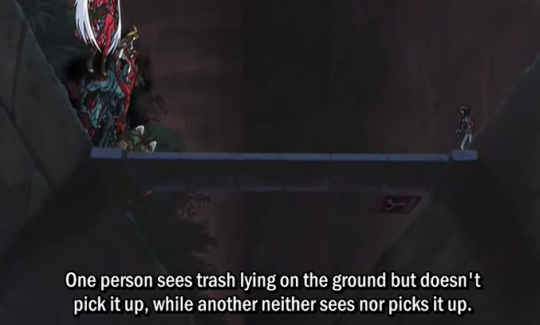
Satou: Now, which one is at fault? Judai: Isn’t it the guy who saw it, but didn’t pick it up. Satou: Not quite. If one is aware of the trash that fell, it may be picked up someday. But there is no possibility fo the unaware one ever picking it up. Judai-kun you are the foolish one unaware of the trash that has fallen. Judai: Are you calling me out for how I am? Satou: Your behavior towards me was atrocious. The worst was attending class only for credit, even if you were there you only slept. Judai: Yeah, I know. I was all bad, but it wasn’t that big a- Satou: It is important. You see, one by one, the students inspired by your attitude were losing their motivation. Now if you were a mediocre duelist, then this would not be an issue. Satou: However, you are the same hero who defeated the three mythic demons. Every single student in the academy admires you. You should have been a model for this academy. Judai: Me, a role model? Are you kidding? I just do whatever I feel like doing. Satou: Great power comes with great responsibility. Yet, as you remain unaware of that, you’ve spread your lethargy and self-indulgence.
seems like a minor issue, but look how Judai responds to the accusations. “I just do whatever I feel like doing.” Satou is arguing that Judai should pay attention to the influence he has on others because of his power, because how he chooses to use that power affects others. However, Judai chooses to actively not look at the consequences of his actions because he doesn’t want to take on that level of responsibility, and therefore he’s looking away from the trash.
While it seems like it doesn’t matter in Satou’s specific example, not thinking of the consequences, or how you use your power can have unexpected consequences. Spiderman doesn’t feel like it’s his responsibility to stop a bank robber, and that bank robber shoots his uncle. You could still argue it’s not Spiderman’s responsibility to stop every crime in the world, and I guess no one owes anyone anything from that point of view - but Spiderman failing to act responsibility had the consequence of directly hurting someone else.
Spiderman has to live with that consequence because it was his own Uncle that was hurt. This is where we really reach the duality of Judai.
In GX, Judai is, symbolically speaking, The Fool of the Tarot Deck, the Novice Alchemist — a person brimming with infinite potential, yet one who is also supremely ignorant, who walks forward with his eyes closed and often unknowingly causes harm in his great ignorance. In this, he is very much the embodiment of the faults we most commonly associate with teenagers — selfishness, recklessness, shallowness, a lack of dedication or empathy when it’s most needed. Like most people, he has good traits that work to balance out some of the above, but his narrative path through GX ends up being that of the flawed hero undone by his faults — and then that of the atoner, the repentant sinner. In his case, the mistakes of his teenage years are the catalyst for his growth from a boy into a man burdened with duty and purpose. Judai is someone with infinite potential, with great power, but also ignorant on how he should use that power, and that makes him an incredibly flawed hero who needs to learn how that power should be used.
Deku similarly exists in a society where heroes deliberately turn a blind eye to the suffering of a certain type of victim. Shigaraki’s speech heavily resmebles Satou’s speech about garbage on the side of the road.
Shigarali: "For generations you pretended not to see those you coudln't protect and swept their pain under the rug. It's tainted everything you've built."
Deku shares Judai’s ignorance, because he’s not only a part of a system that doesn’t even see trash on the side of the road, but he also worships heroes so much that he’s incapable of criticizing them. If Deku saw the flaws of heroes, but at first didn’t have the courage to speak out, but eventually gained the courage that would be one thing. However, if he doesn’t see the flaws of heroes, then the problem will never be fixed.
There are also consequences for both Judai and Deku failing to use their powers responsibly. These consequences take the form of the villains who came about because of all of society’s ignorance to the suffering of victims (Shigaraki) and because of the main character’s ignorance to their suffering (Yubel). Shigaraki and Yubel are also explicitly victims that the heroes failed to save, turned into villains who are active threats to the heroes.
Should I save the villain?
The answer is yes, because the decision to save is reflective of the kind of hero each character wants to be. Each story clearly sets up that Deku and Judai aren’t punisher style heroes who shoot their villains, they are being set up as heroes who save. Deku needs to “save by winning.” As for Judai, a big deal is made of Judai’s admiration for another character Johan who represents a more idealistic kind of hero. Johan unlike Judai is someone who duels with a purpose, something Judai outright says he admires because he’s empty in comparison.
Judai: Johan what have you been dueling for? See, it’s about fun for me… Well, for the surprise and happiness too. I guess I do do it for the fun. Sorry, I guess I put you on the spot by asking out of nowhere. Johan: What’s this about Judai? Judai: It’s nothing. Johan: I suppose there is one goal I have. Johan: Even if someone doesn’t have the power to see spirits, they can still form a bond with a spirit. That’s why I do it for people like him. [...] Johan: I'll fight for everyone who believes in me, and I'll do it with my Duel Monsters. Judai: I'm jealous you've got feelings like those in you.
Becoming a hero who uses their power to help others isn’t just a goal the story sets for Judai, it’s a goal that Judai sets for himself because of his admiration for Johan. Johan represents the idealistic hero Judai wants to be, but is also held back from because of his personality flaws. Johan represents the kind of heroic ideal that Deku is aspiring to be.
Johan’s ultimate goal isn’t punishing the wicked, but to use his power to save others.
Johan: Judai, it was my dream to save everyone through my dueling!
The story sets up the idea that it’s not enough for Judai to simply be strong, he’s also challenged to become a savior who uses his power to help others like Johan. Deku needs to “save by winning” and Judai needs to “Save everyone through his dueling.” However, Johan also adds another condition to what saving means. His idea of saving isn’t to defeat a villain, but rather his dream is to help connect spirits and humans together, even if there are humans who can’t see spirits. Johan doesn’t save people with the power of physical force, but rather the power of human connection.
Should I save the villain?
Here the answer is "Yes", because wants to become more like Johan someone who uses their power to help others not just for themselves. Then we reach the third question
If I don't save the villain, can I really call myself a hero?
It once again comes to power and responsibility. Heroes have great power, and they are responsible in how they use that power, if they use it irresponsibly then there are consequences. Shigaraki wants to destroy hero society, because the heroes irresponsibly use their power to turn a blind eye to everyone’s suffering.
People suffer when heroes fail to live up to their responsibilities. The entire conflict of season 3 is created by Judai failing to save Yubel. If Judai had helped Yubel when they most needed it, instead of abandoning them, then Yubel would never have been twisted by the light of destruction, would never have attempted to teleport the school to another dimension, would never have attacked all of JUdai’s friends.
These consequences matter. Deku can turn his eyes away from Shigaraki’s suffering, but let’s say a hero failed to stop a robbery, or rather he didn’t even try, and because of that his mom was shot and died in the street. Would Deku consider the man who failed to stop a bank robbery a hero? When Spiderman let a bank robber go instead of trying to stop him, was he being a hero in that moment? Both the stories and the characters themselves have defined heroes as people who use their powers to save others, therefore if Judai and Yubel fail to save their villains then they can’t be called heroes by the story’s own definition. Now let’s finally return to the question of "Can I save the villain?"
Was there ever someone you couldn’t save?
m going to start with Yu-Gi-Oh Gx as a positive example of how to save your villain. Gx works for two reasons. One, it’s established from the start that Yubel isn’t beyond salvation, and two, it makes it so Judai can’t win without saving Yubel. The conflict of the story does not end until Judai makes the decision to save Yubel. In some ways the writing is even stronger because Judai is directly responsible for the pain and suffering that Yubel went through that turned them into a villain in the first place. Yubel isn’t just a victim, they’re specifically Judai’s victim.
Yubel is a duel spirit who is also essentially Judai’s childhood friend. A duel spirit just like the kind that Johan wants to save. During their childhood Yubel got too overprotective of Judai, and started to curse his friends for making him cry or upsetting him in any way. Until everyone Judai’s age started avoiding him and Judai became all alone with only Yubel for company. Judai’s decision was to abandon Yubel at that time. He took the yubel card and shot them into space, hoping that being bathed in space rays will somehow “fix” what was wrong with them. I know that’s silly but just go with it. Judai abandoning Yubel had the unintended consequence of Yubel being subjected to the light of destruction, a corrupting light that subjected Yubel to years of pain. This pain literally takes the form of Yubel burning alive.
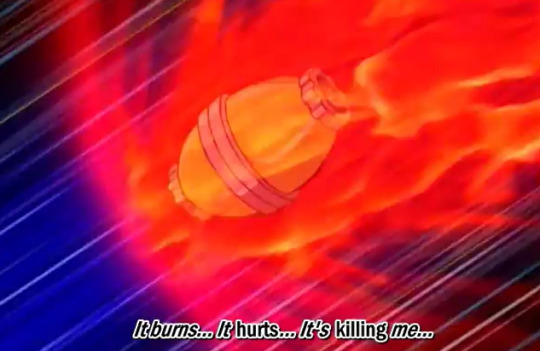
Yubel connected to his dreams called out for Judai every night, only for Judai’s parents to give him surgery that repressed his memories of Yubel causing him to forget them entirely. Yubel then spent the next ten years alone in space, continuously subjected to painful torture, with their cries for help being ignored.
"I was suffering even as you came to forget about me..."
Yubel is then met with the question of how can Judai treat them this way if they loved him so much? As from Yubel’s perspective, they’ve only ever tried to protect Judai, only for Judai to not only throw them away, but subject them to painful torture and ignore their cries for help. Judai effectively moves on with his life, goes to duel academy, makes friends while Yubel is left to suffer in silence all but forgotten. This is where Judai’s ignorance has serious plot consequences.
It’s not just the pain that Yubel endured that made them snap. It’s that their pain went ignored.
Yubel holds out the faint hope that Judai will answer their calls fro help until they finally burn up upon re-entry into earth’s orbit. At which point they’re left as nothing more than a single hand crawling on the ground. Yubel who cannot fathom why Judai would cause them so much pain, and then forget about them, convinces themselves that Judai must be causing them pain, BECAUSE he loves them.
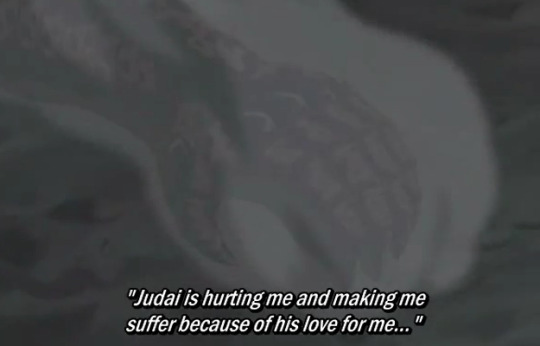
But you see, I couldn't possibly forget about you in the time that I've suffered...
Judai is allowed to move on with his life, to make friends, to spend the next ten years doing so while Yubel is subjected to ten years of agony. When they finally escape their painful torment, they see all the friends Judai has made while they’re left alone and forgotten. However, Yubel’s goal isn’t revenge. Rather, it’s to make Judai share and recognize their pain. WHich is why I said it’s not the fact that they were made to suffer, but their suffering is ignored. Yubel’s entire philosophy revolves around the idea that sharing pain is an expression of love, and that they and Judai share their love for each other by hurting each other.
"That's why I sought to fill all those linked to you, your world, with both sadness and anguish..."
For Yubel, making all of Judai’s friends suffer and Judai themselves suffer is a way of making them and Judai equals again. They want to show “their love” for Judai, but it’s more about forcing Judai to recognize the pain he’s caused them by forcing him through the same pain. Yubel’s philosophy of sharing pain is actually a twisted form of empathy.
They’re not entirely wrong either, that even people who love each other can cause each other pain, and that if one person is suffering alone in a relationship or the suffering is one-sided then there’s something wrong with that relationship.
Yubel: I get it now… You weren’t in love, with Echo. Yubel: No.. you may have loved her just enough to clear the conditions in palace for you to control Exodia, but the you didn’t truly love each other. Yubel: You were only unfairly hurting her, while you stayed unharmed. You wouldn’t suffer. You wouldn’t suffer. You wouldn’t be in pain. Amon: What are you getting at? Yubel: I’ve been hurt! I’ve suffered! I’ve been in pain. That’s why I’m making JUdai feel the same things I did!
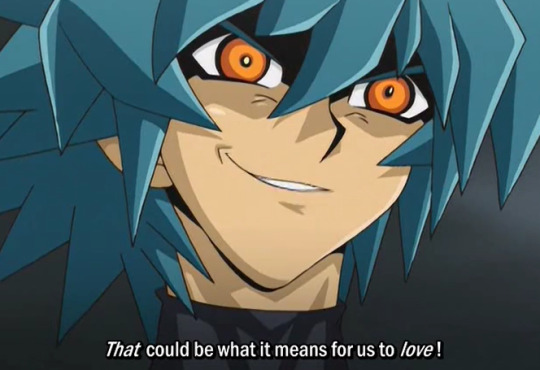
Yubel’s twisted theory of love, is a pretty thinly veiled cry for empathy.
They break out into tears when talking to Amon about the way they’ve hurt and suffered. They clearly state upfront that their goal is for Judai to recognize their love. One of the first things they say to Judai is a plea for Judai to remember them.
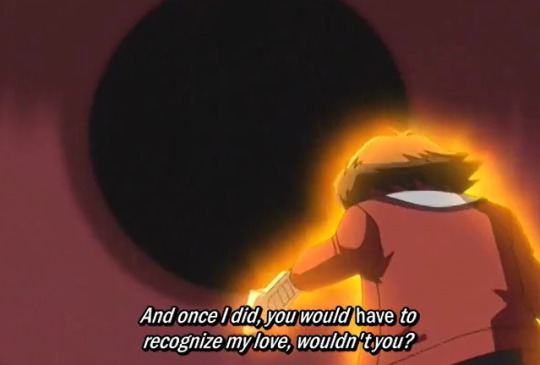
Yubel is presented as a very human character suffering through a lot of pain throughout their entire villai arc, they break down into tears multiple times, they cry out in agony, they're visibly suffering and you see their mental walls begin to break down when Judai denies them any empathy.
Yubel is actually incredibly clear and straightforward about their desire to be saved by Judai. However, Judai doesn’t lift a single finger to help Yubel the entire arc, even though they themselves admit they are directly responsible for Yubel’s suffering but they helped create who they are today.
Judai plunges into a different dimension and gives up everything to save someone, but it’s Johan, not Yubel they try to save. You have Johan, the perfect friend, and perfect victim that Judai gets obsessed over and will not stop at anything to save, and then you have Yubel, the imperfect victim that is actively harming Judai and all of his friends that Judai chooses to ignore. The whole season Judai only focuses on saving the perfect victim Johan, and this is clearly shown to be a flaw. Judai doesn’t just ignore Yubel to save Johan, he also ignores every single one of his friends.
Judai only caring about saving Johan, and deliberately ignoring and abandoning the friends who came with him to help, essentially abandoning them the way he did Yubel leads to another consequence. After he abandons them they get captured, rounded up, and actually die and become human sacrifices.
Losing his friends, causes Judai to snap. Judai becomes the supreme king and decides power is all that matters; he starts killing duel spirits en masse in order to forge the super polymerization card. Which means being left alone, suffering alone, being abandoned by everyone causes Judai to snap the exact same way that Yubel did.
In fact Judai is only saved from his darkest moment, because two of his friends sacrifice their lives, trying to get through to him and appeal to his humanity. At that point Judai’s friends could have just chosen to put him down like a mad dog, to punish him for the amount of people he’s killed, but instead they try to save him because of their friendship.
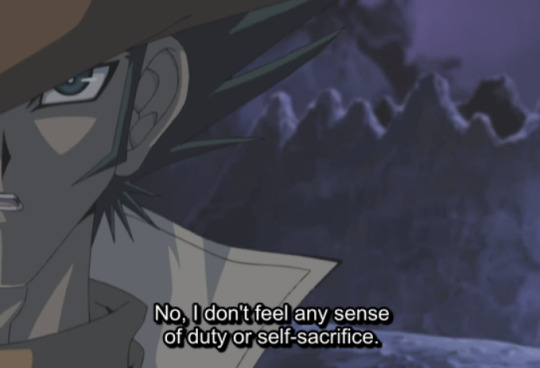
I just want to save my friend. That is all.
By the time Judai is facing Yubel in their final fight, Judai doesn’t have the moral highground against Yubel in any way whatsoever. They’ve both lashed out because of the pain they endured and killed countless people in the process of lashing out. The only real difference between them is that Judai is lucky. He had friends to support him at his lowest point, while Yubel didn’t. Does Judai learn from Jim’s example, and go out of their way to save Yubel the same way they were saved because Yubel is still a friend? Nope, Judai tries to kill Yubel at this point.
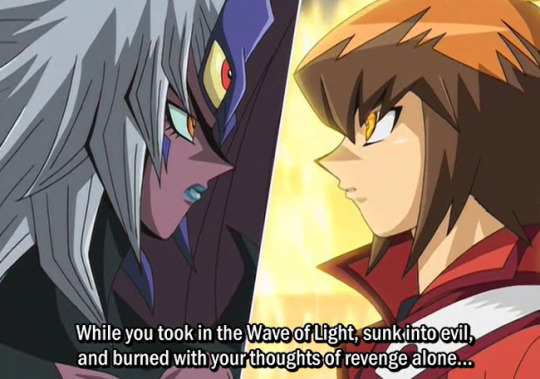
I made a lot of friends... And they all taught me something… real love is wide enough, large enough and deep enough to fill the universe. Your so-called love is only a conceited delusion.
Like, Judai, sweetie baby honey darling. How was Yubel supposed to make friends when they were floating in the empty void of space?
Judai hasn’t learned, they are still ignorant, and still turn a blind eye to Yubel’s suffering. After all if his love is wide enough, large enough,and deep enough to fill the universe then why don’t thy have any room in their heart whatsoever for empathizing with Yubel?
Judai making friends while Yubel was trapped in space doesn’t make Judai a better person than Yubel, it makes Judai lucky. Judai doesn’t even appreciate that luck, because he treats his friends like garbage. It’s not about whether Yubel is worthy of salvation, because Judai is a mass murderer and his friends still went to great lengths to save them anyway. It’s that Judai doesn’t want to empathize with Yubel, because they still want to remain ignorant and irresponsible. Judai wants to continue playing hero, with a very black and white definition of what a hero is. By this point Judai’s killed lots of people, but if he makes Yubel the villain in the situation, he can keep playing hero. He doesn’t have to look at himself and what he’s done, because blaming everything that happened on Yubel and then putting Yubel down like a mad dog allows Judai to absolve his own guilt. Judai practically ignores Yubel’s cries for help, even when Yubel spells it out for them.

I couldn't have lived with the heartache unless I felt that I was being loved...
At this point Yubel themselves acknowledges that their love was just a delusion. That it was a coping mechanism, because they couldn’t live with all the pain otherwise. WIthout it they would have just died, which makes Judai unmoved. The implication here is that Judai thinks yes, Yubel should have just died in that crater. It would have been easier for Yubel to die a perfect victim, then for Yubel to crawl out of that crater and go on to hurt other people. While that may be true the same can be said for Judai - it would have been better if Judai died rather than become the Supreme King. His friends could have put him down like a mad dog, you could have even called that justice - but they didn’t. Judai making no attempt to save Yubel isn’t because he thinks it’s morally wrong to save someone who’s killed as many people as Yubel has, or because he thinks he can’t forgive Yubel, it’s because Judai is taking the easy way out. Johan is a nice, easy victim to save, because he’s Judai’s perfect boyfriend, while Yubel is a complex victim that requires Judai to understand their suffering. Even the act of saving Johan isn’t about Johan himself, it’s about the fact that Judai feels guilt over Johan’s disappearance. What Judai wants isn’t really to save a friend, but to stop feeling guilty over that friend. Judai isn’t just disgusted by Yubel’s actions towards his friend, he also wants to avoid the guilt he feels over causing all of Yubel’s suffering, because it requires acknowledging the complex reality that he is both victim and perpretrator in this case, just as Yubel is both victim and perpetrator.
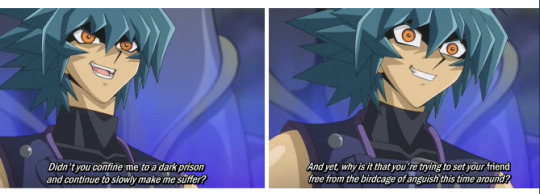
So how can an arc where Judai doesn’t try to save Yubel until the last possible minute, be better than an arc where Deku makes it his goal for the final act of the manga to save the crying boy in Shigaraki?
It’s because the story does not let Judai get away with his continual refusal to empathize with Yubel. Yubel’s entire character revolves around empathy, in the form of sharing pain. As a duel monster, Yubel’s effect is that they are a 0/0 attack monster who is immune to all damage, but when you attack them they deal all the damage back to you. Which means that Yubel will respond to all the pain they feel, by causing you just as much pain in return. Yubel is not a character who can be defeated in a fight, or a duel. In fact they’re the only Yu-Gi-Oh villain who never loses a duel once. The most Judai can do is duel them to a draw, and they draw three times. Yubel wins against everyone else who challenges them. In a way Yubel is like Shigaraki, the ultimate, unkillable enemy that can’t be done away with violence. Judai’s refusal to empathize with Yubel or attempt communication also makes them worse, every time Yubel is hurt they escalate. THe more Judai hurts them, the more they will hurt in return, it’s a cycle that will never be broken simply by killing Yubel, because Yubel is unkillable.
Not only that but the story has gone to great lengths to show that saving Yubel is the correct course of action. If Judai doesn’t save Yubel, he’s basically spitting on the selflessness Jim showed in saving him. In fact if he doesn’t save Yubel, Judai is contradicting his own words on what makes a good friend. Sho once asks Judai after witnessing his brother change, what he should do if a person you lov ehas changed into an entirely different person. What if they're a person you don't even recognize any more? A person you don’t even necessarily like anymore?
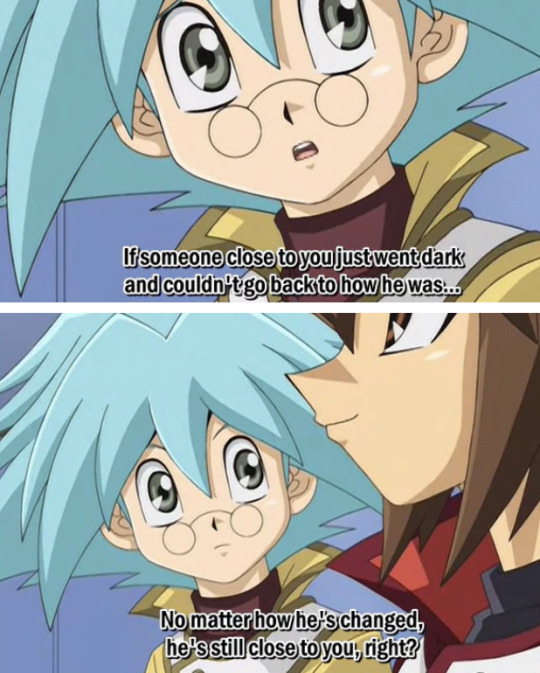
That's why if it were me. I'd probably just be looking after him until the very end, even if I didn't like him. I'd do it cause I think it'd prove that I care about him.
Judai doesn't even say that Sho is obligated to save his brother or morally redeem him, just that he has to keep looking at him instead of turning away or ignoring him.
Judai is being a bad friend, by his own definition. By choosing to deliberately look away from Yubel, Judai’s not living up to his advice for Sho for how you treat people you care about.
Which is why the resolution for Judai and Yubel’s arc is so important, because it’s done by Judai finally acknowledging Yubel’s pain, and promising to watch over them from now on, words that are followed by the action of physically fusing their souls together so they’ll never be alone again. Judai doesn’t just say pretty words about how they won’t ignore the crying child inside of Yubel, but instead he makes a sacrifice to save Yubel at risk to themselves to show their words are backed up by actions. Judai says Yubel will never be alone again, and then he commits.
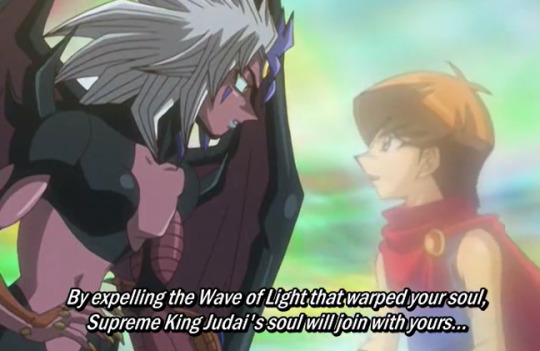
"And even if that means I won't exist anymore... I don't care."
Judai has resolved his character arc by this action, because Judai is finally taking on responsibility and that responsibility is watching over Yubel, so the two of them can atone together. Judai even says himself this isn’t an act of sacrifice on his part, but rather him finally accepting adult responsibilities.
Judai: I wouldn't sacrifice myself for you guys. I'm just going on a journey to grow from a kid into a man.
Judai needed to save Yubel to complete his character arc and grow as a person. If Judai hadn’t saved Yubel, he would have still remained an ignorant child. By learning not to turn a blind eye to Yubel’s pain, and also smacking sacrifices and physically doing something to atone for the way they ignored Yubel up until this point they’ve not only saved Yubel they’ve also done something to address their wrongs. This also continues into the fourth season where Judai’s personal growth results in him learning what kind of hero he wants to be as in Season 4 in order to atone for the spirits that Judai slaughtered, he decides to leave his friends behind and walk the earth with Yubel helping spirits and humans get along with each other. In fact Judai’s final speech as a character isn’t even about how strong he is as a hero, but how weak he is as a person.
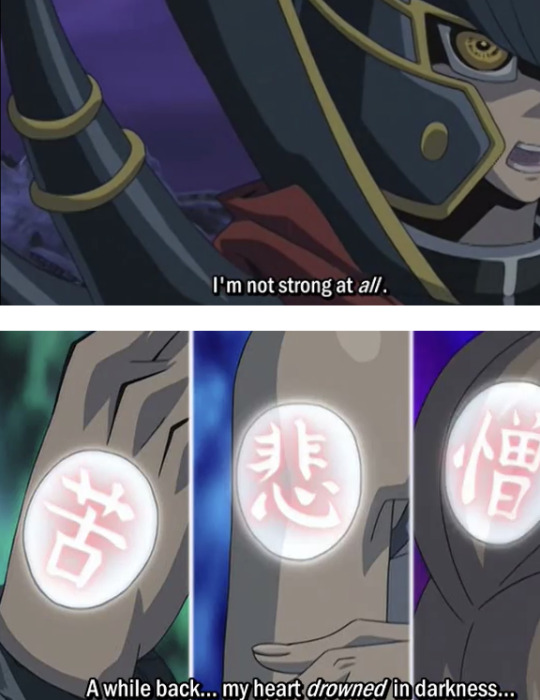
And I put my friends through some rough times. Form that, I figured a few things out... all I can do is believe in them.
The lesson Judai learned is because he’s weak, he needs to empathize and believe in other people the same way that his friends once believed in him when he was at his lowest point. Judai’s not the strongest hero, he’s the weakest one, but that gives him the ability to empathize with people who were lost just like he was, and guide them back from the darkness.
The story of how Deku became the worst hero.
I’m going to say this right now it might turn out next week that Shigaraki is just fine, and he’ll use the overhaul quirk to reconstruct his body. However, even if that happens Deku has completely failed at his goal of saving Shigaraki for the reasons I’ll illustrate below. In theory, Deku’s arc of saving Shigaraki, and therefore winning by saving should be much easier for the story to accomplish and also much less frustrating to watch. After all, Shigaraki has been around since the beginning of the manga, he’s literally the first villain that Deku faces. He’s also the first villain that Deku talks to, where he brings up the idea that there were some people All Might failed to save. There’s also many intentional parallels between the two characters, the entire manga is about their parallel journeys of becoming the next generation hero and the next generation villain. Shigaraki even directly quotes the line at one point that all he wanted was for someone in his house to tell him he could still be a hero, the same line Deku said in the first chapter was that he wanted his mom to tell him to be a hero instead of apoalogizing to him for being quirkless.
Not only is the setup for Shigaraki and Deku made obvious (Deku can redeem Shigaraki by telling him that he can still be a hero too), but Deku himself states out loud that he wants to save the crying child inside of Shigaraki.
Judai runs away from Yubel the whole time, whereas Deku is running towards Shigaraki and actively makes it his goal to understand Shigaraki and continue to see him as a human being rather than a villain. The story also makes it clear that saving Shigaraki is necessary to saving hero society as a whole. After all Yubel is just Judai’s victim. Whereas Shigaraki is the victim of all of society. He’s the crying child who was ignored. The cycle won’t be broken if heroes continue choosing to ignore people like Shigaraki, because more victims will grow up to replace him.
Shigaraki: Everything I've witnessed, this whole system you've built has always rejected me. Now I'm ready to reject it. That's why I destroy. That's why I took this power formyself? Simple enough, yeah? I don't care if you don't understand. That's what makes us heroes and villains.
Shigaraki rejects the world because the world continues to reject him. THe solution to this problem is not rejecting Shigaraki, because Shigaraki won’t go away, the system will just continue to reject people like Shigaraki. As long as heroes and villains don’t understand each other, they’ll keep being forced to fight and the conflict won’t end, because hero society is what engineers it’s own villains.
clear as day by the story itself. If the objective of saving Shigaraki is clear, then how exactly did the story fail in this objective? What went wrong? In this case it’s a failure of framing, and breaking the rules of “show don’t tell.” Stories are all about actions and consequences. When a character makes a certain action in a story, the way other characters around them, the world, and whatever consequences that action frames that action in a certain light. It provides context for how we are supposed to interpret that character in that moment.
For example, when a character does something wrong and another character directly confronts them over what they did wrong, that frames them as in the wrong. The story is criticizing the character for what they did wrong. Context is everything in a story. Stories are just ideas, so they require framing and context to communicate those ideas for the audience. Certain character attributes can be strengths or flaws depending on the context. My go to example is that if you put Othello in Hamlet, the conflict would be resolved in five seconds because Othello’s straightforward personality and determination would have him kill Hamlet’s uncle without questioning things. Whereas, Hamlet constantly questioning and second guessing himself would lead to the worst ending possible. However, if you put Hamlet in Othello, then Hamlet wouldn’t fall prey to Iago’s manipulations, because Othello doubts and questions everything so he wouldn’t believe Iago the way Othello did.
Hamlet’s contemplative and introverted nature can be a strength in one situation, and a flaw in another. Othello’s tendency to act without thinking things through can be a strength in one situation, and a flaw in another. Context matters, because context tells you how you’re supposed to interpret a certain characters actions, and therefore tells you more about that character. This is why people repeat “Show don’t tell” as the golden rule of storytelling, it’s one thing to say something about a character, it’s another to us the characters actions in the story itself to show them something about the character.
What’s even worse then breaking the rules of show don’t tell however, is telling the audience one thing, and then going onto show in the narrative something completely different. In that case the narrative becomes muddled and confusing to read. If I the narrator say “Hamlet is someone who overthinks everything” and then in the story Hamlet walks up to his uncle and kills him with no hesitation, then the narrator is straight up unreliable. It becomes impossible to tell as an author what message I’m trying to get across about these characters, because I’m telling you one thing and showing another.
This is why the writing fails in the second half of My Hero Academia because we are constantly told one thing, but then the story shows something entirely different and sometimes even contradictory to the thing we are being told.
Judai is a much worse hero than Deku, he always runs away from Yubel, and we’re never directly told that he’s supposed to save Yubel either. However, the narrative is incredibly consistent. Judai’s behavior of running away is consistent with his character. All the other character call Judai selfish for abandoning his friends (and they’re not even talking about Yubel). Judai is never painted in any positive light for his actions, therefore we as the audience understand Judai’s behavior is wrong and he needs to fix it. The narrative makes it clear that Judai needs to grow up, and Judai is never rewarded for his refusal to grow up, he’s ruthlessly chewed out, not by his enemies but also by his own friends. However, the narrative isn’t merciless on him either. Season 3 of GX is dark, but it’s not grimdark. Even when Judai loses his way, he’s still shown love and compassion by those same friends who go to great lengths for his sake. The narrative criticize Judai but it never insists that he’s beyond redemption and needs to be put down like a mad dog.
The message is very clear, that not only does Judai need to grow up, but he also deserves the chance to grow and change, which is why he should give Yubel a similar chance. In comparison the story sets out this clear narrative arc for Deku of understanding Shigaraki, but it never challenges him for failing to understand Shigaraki. If you listen to what the narrative says, how other characters describe Deku, and what Deku himself says and only read it on a surface level then yes, Deku’s goal is to save Shigaraki. If you analyze actions however, he is in effect just like Judai he never takes any meaningful action or steps towards Shigaraki, nor does he think of what saving Shigaraki might look like or entail.
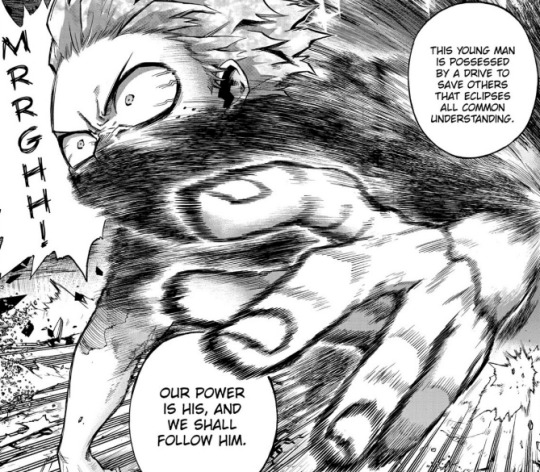
The story describes Deku as someone who is possessed by a drive to save others that eclipses all common understanding, but does the story give us any examples of that behavior?
Judai is characterized as a selfish, irresponsible child, and the story gives us countless examples of his immaturity and how it hurts others. Does the story of MHA do the same for Deku's purported virtues? Let’s run through Deku’s actions, step by step, the actions themselves and how they are framed in order to find any evidence that Deku possesses this drive to save others. Does Deku reflect at all on the question of:
Can Shigaraki be Saved?
Deku leaves on a journey to try to understand villains. When he makes a perfunctory attempt to understand and empathize with Muscle, and Muscle replies that some people are just evil does Deku keep trying to reach his heart? Nope, he just punches him.
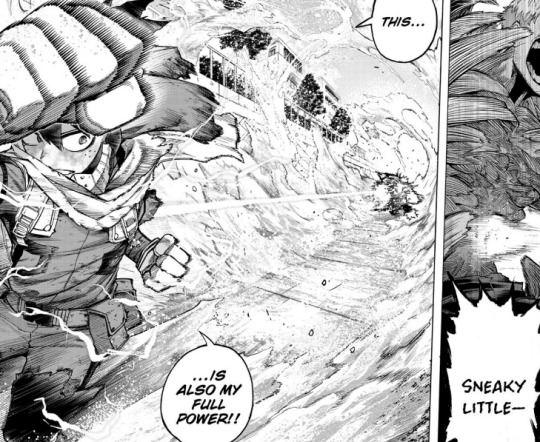
Well, if he’s failed in his goal of understanding a villain then does the story call him out on his failure? Does Deku face any sort of narrative consequence for that failure? Is he framed negatively for failing to understand Muscle, the same way that Judai is framed for abandoning Yubel? Nope. Deku doesn’t express any frustration at all over is inability to reason with Muscle. There’s also no negative consequence for Deku just choosing to punch muscle, it turns out that there was no reasoning with Muscle and some people are just bad eggs so Deku was right. It’s okay for characters to fail, but if a character fails and it’s not framed by the story as a failure then the writing itself as failed. Why even bother to include this scene in the first place if it doesn’t advance Deku’s character in any way? This scene in spite of showing Deku failing to understand someone actively paints Deku in a positive light, because of how much stronger he is ow that he can OHKO a guy that gave him trouble all the way back in the camp arc.
This scene doesn’t tell anything about Deku as a character, it just makes him look cool. In fact that’s precisely the problem, Deku isn’t adequately challenged as a character, because he’s never allowed to fail. Even when he does obviously fail at the things the narrative set out for him to do, he’s never challenged on those failures, because the priority isn’t to make Deku grow, it’s to make Deku look good. As I said before, Judai is the hero because he’s the weakest. Deku is the hero because he’s the strongest. Well, next a big flaw on Deku’s part is that he worshippd the same heroes that were making the world corrupt. Heroes like Endeavor who created people like Dabi. So, does Deku take action to either criticize the older generation of heroes, or separate himself from them in order to try to be better than them? Nope, he teams up with them. Not only that, Deku can’t do something as simple as tell Gran Torino out loud about his plans to save Shigaraki. If Deku feels that Shigaraki is worthy of salvation then he should at least try to make an argument here about his ideal of saving others.
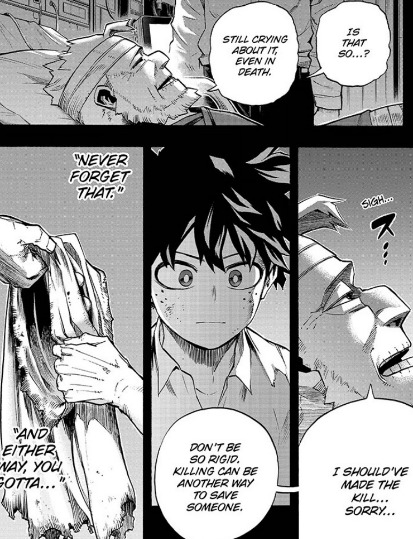
Now here’s the thing, if Deku hadn’t directly looked at the camera and told us he wanted to save Shgiaraki, would we be able to deduce his intentions from his actions? If you took away all of Deku’s internal monologue, and just showed him punching Muscular and saying nothing when Gran Torino says he may have no choice but to kill Shigaraki would anything about Deku’s actions indicate that he wants to save Shigaraki? Let me use avatar the last airbender as a positive example for a moment. People say that Aang’s desire to spare Ozai’s life comes out of left field, but like if you analyze Aang as a character down to their bending, and the way they react in situations they always prefer de-escalation, or taking a third option as opposed to confronting things head on. It’s literally why Toph says Aang has trouble learning earth bending, because as an airbender, he always tries to look for some other way to solve the problem, instead of a direct confrontation with force. As early as season one, Aang tells Zuko someone who has tried to kill him several times that he was friends with someone from the fire nation one hundred years ago and in a different situation they could be friends. Aang’s desire to save the Firelord may not have been told to us until the last possible minute, but Aang’s aversion to violence has always been a part of his character from the beginning. However, Deku never shows any similar aversion to violence. There’s basically no example where he ever tries to de-escalate a situation, or he avoids a conflict by seeking a third option.
Anyway, let’s move onto the next example. In the confrontation where Lady Nagant fights Deku, when Deku learns the fact that the heroes were employing government hitmen to attack people for uhh… exercising free speech does Deku give any reaction to this information? When Lady Nagant says that Deku is only going to bring back the status quo, does he show her any meaningful evidence that he won’t do that.
Deku’s response is because the world is so grey, he needs to extend a helping hand to others. Which you know what thay could be a response. Deku saying that his response to the corruption of the hero world is that he now understands that society led some people down the wrong path, so his way of addressing the wrongs of that society is lending a helping hand to as many people as possible even people he used to think was irredeemable.
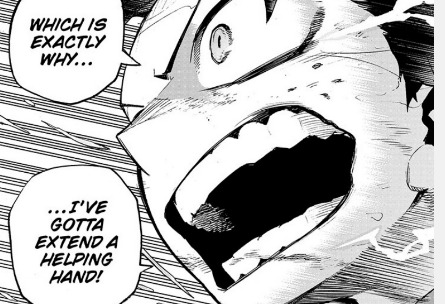
I will give Deku the benefit of the doubt, I think this is an acceptable answer. I can’t save everyone, but that’s not going to stop me from trying to save as many people as possible and maybe I can save people who were this society’s victims on the way too. However, does Deku demonstrate his resolve to extend a helping hand in any meaningful way.
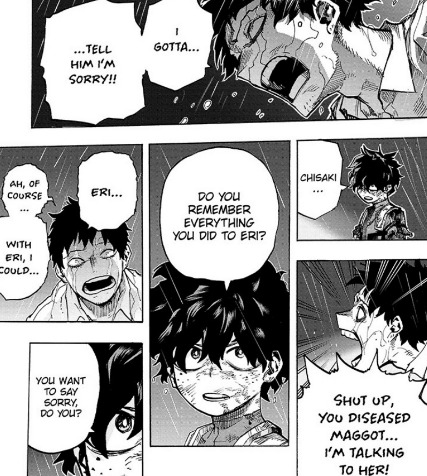
Deku is met with an armless, insane Overhaul who’s begging for someone to help heal his father figure in the Yakuza from his coma. This isn’t like Muscular who insists that there’s no helping him, Deku is met face by face with someone asking him for help. Deku’s gotta extend a helping arm whenever he can, because he knows some people were abandoned and led astray by this society… Unless that person is someone he doesn’t like personally. At which point he only helps them on a conditional basis. We are told Deku will save anyone and everyone, but Deku is met face to face with an armless man who is begging for help and Deku’s does nothing to help him. Deku’s not criticized for refusing to help overhaul either, it’s never brought up again. When Deku begins to experience a mental breakdown because of all the people he’s trying to help in the Dark Deku arc, we are told this is the result of Deku trying to save everyone, but we do not see Deku attempting to save a single villain after Muscular and Nagant.
He exhausts himself beating up villains that AFO sends after him, and only helping innocent civilians. Which would be fine if this arc were about how Deku is running away from his real responsibilities the same way that Judai was running, but that’s not what we’re being told. We are told that this is all part of an arc of Deku learning to understand villains and be a hero.
Deku is asked “Can you save Shigaraki?” by the story, but Deku never at any point has to deliberate on that question. Judai doesn’t deliberate on that question either, but him choosing not to think about things and stay ignorant is the point.
It’s actually fine to make Deku stagnate as a character. It’s fine to have him take the easy way out by just punching villains and giving up on them after one conversation. It’s fine for him to be empathetic to other people’s suffering, or even self-righteous. It’s fine for him to be ignorant.
He could be all of those things if it was a part of a narrative teaching him to unlearn his behavior. In fact the narrative might have been better if Deku started out by saying he didn’t want to save Shigaraki, that there was no choice but to kill him, because then at least his actions would be consistent with his words. Then his lack of empathy and his tendency to resort to violently beating up villains instead of avoiding violence would be character flaws he could work on. Deku however, is presented to us as this empathic hero who is always willing to give others a second chance though he never actually sticks his neck out in order to do so. Continuing on with our slow crawl through MHA, one of Deku’s friends is revealed as the traitor. Deku has a heartwarming scene fo saying that Aoyama can still be a hero, but look at his actions. He lets the adults in the room physically tie Aoyama in a straightjacket and imprison him, for the crime of… doing bad things while he was in a hostage situation. Apparently, if a bank teller helps the bank robber by giving them money when the robber has a gun to his head, the swat team should just snipe the bank teller. Not only does he not defend Aoyama against the adults, or stand up for him, or tell the adults they’re wrong to treat Aoyama a clear cut victim who had a gun to his head and was bing held hostage like he’s a villain - he also lets the adults use Aoyama an innocent victim as bait in order to lure out AFO. Deku tells Aoyama he can still be a hero, but he doesn’t defend Aoyama as a victim of being taken hostage, nor does he stop the adults from further taking advantage of him and throwing him right into danger. Some people are just led the wrong way that’s why they need to be extended a helping hand, but fuck Aoyama I guess. He needs to earn the right to be sympathized with by physically putting his life in danger.
Deku can’t even go out of his way to save a friend who he’s known for the better part of a year, when that friend is a complex victim forced to do bad things.
Then Deku and Uraraka have a conversation where they both, kind of ruminate on the idea that maybe the villains are human beings who are worthy of sympathy.
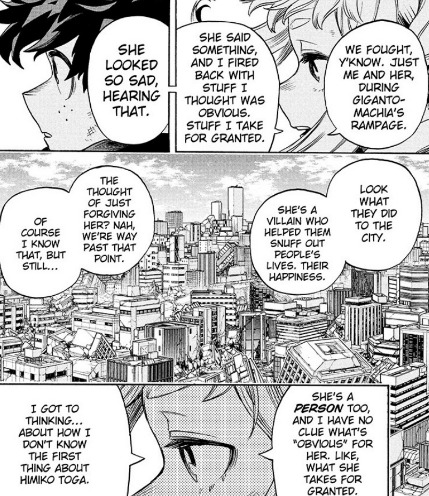
In fact Uraraka is actively trying to dehumanize Toga by looking at the destroyed city, so she won't have to think of Togaas a person.
The language here is also a major fault of this arc. It focuses far too hard on “forgiveness” over and over again. As I said before, saving Shigaraki isn’t about Shigaraki at all, it’s about Deku, and how he wants to use his power as a hero. Deku has even stated himself that he doesn’t believe that OFA is a power that should be used for killing people. So why does whether Toga or Shigaraki are forgivable or not even matter? It’s the same with Deku refusing Overhaul any sympathy. If he’s so morally opposed to abusers, then why does he work with Endeavor and defend him at every visible opportunity, even in front of his victims? Whether or not Deku can forgive Shigaraki doesn’t matter, because Deku is not the moral arbitrator or right and wrong. In fact Deku doesn’t even have any morals, so how is this a moral debate? Is there any point where Deku gives a clear definition of what he thinks right and wrong is? Does he quot Immanuel Kant to the audience?
Batman doesn’t kill people, not because he thinks that every last person on earth can be saved, but because Bruce Wayne an incredibly rich white man thinks that maybe he shouldn’t have the authority to decide who lives and who dies. When Bruce doesn’t kill the joker, it doesn’t mean he thinks the Jokers actions are forgivable, it’s because Bruce thinks it’s not his place to determine whether someone has the right to live.
The whole conflict that MHA presents us is that heroes pick and choose who to save, and only save the ones they deem as innocent. So, how does Deku saying repeatedly they can’t forgive Shigaraki contribute to that theme in any way? In fact by focusing on forgiveness, rather than whether or not he personally has the right to pick and choose who lives and who dies Deku is ignoring the elephant in the room. The question isn’t about whether Shigaraki’s redeemable or if his deeds should ever be forgiven. The question is whether Deku has the right to decide who gets saved and who doesn’t.
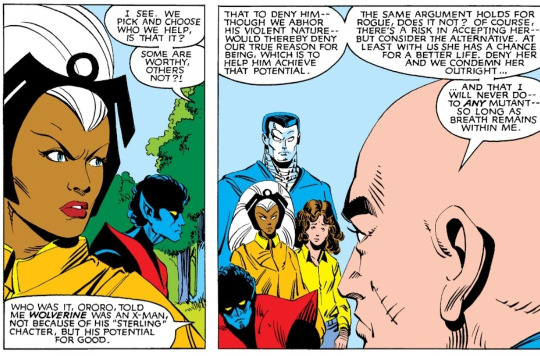
We are told that Deku as a character is someone who wants to save everyone no matter what, so Deku shouldn’t be focusing on whether or not Shigaraki is worthy of forgiveness, he should be making an idealistic argument like Xavier does in this panel. Why doesn’t Deku talk out loud with Uraraka on how he believes his power is for saving others, and not killing? If he’s meant to represent some idealistic hero, then why doesn’t he even talk about his ideals? Why don’t I as the reader know what those ideals are?
I think Xavier’s ideals of forcing the X-men to provide a good example to the mutant community, in order to try to earn the respect of other human beings is wrong, but at least he has ideals. He tries to inspire the other people around him to live up to those ideals. The story can criticize him for his ideals and point out how they’re wrong, while it can also uplift parts of his idelogy like where he believes there are no evil mutants. Deku has a chance to do the same to Uraraka, to tell her clearly, “I don’t think we as heroes have the right to pick and choose who we help…?” but he waffles. Not only does he waffle, but this moment is meant to be read as an indication that both Deku and Uraraka are sympathetic individuals who want to save their villains. They are supposed to look good and idealistic here and they don’t. For Deku it just seems like a repeat of his behavior with Overhaul. The only villains that are worthy of sympathy, are the ones that he personally decides are forgivable.
The story isn’t about whether or not it’s moral to save someone who’s killed as many as Shigaraki has. The story never seriously discusses any sort of complex morality or moral philosophy. Once again to bring up avatar, yes you can argue Aang sparing the life of a war crimminal is bad, but Aang mentions on multiple occasions that he wants to retain the cultural values of the airbending people. Aang has a morality, a consistent morality, it might not be a morality you personally agree with but at least he has one. Deku hates abusers, unless he’s next to Endeavor then he thinks abusers should be given the chance to atone. Deku doesn’t believe that One for All is a power for killing, but he never stands up to any of the adults who are blatantly trying to kill Shigaraki, he doesn’t even express out loud to Uraraka that he doesn’t think heroes have the right to decide who lives and who dies. In fact he’s given the perfect opportunity to, when Hawks kills a villain and it’s broadcast live on the news in font of everyone, but Deku never has anything to say about that. The reason Deku and Uraraka both put such an emphasis on “forgiving” their villains has nothing to do with the story itself. It’s because the author Horikoshi, is afraid that some people will misinterpret his story as saying that he actually thinks that saving a villain like Shigaraki means that he condones mass murder, so he has to have the characters talk about not forgiving Shigaraki.
Judai doesn’t have any consistent morals either, but once again that’s the point and something the story relentlessly calls him out on.
Cobra: Fortune would never smile on a fool like you who fights while prattling on about enjoying duels. Cobra: You are certainly a talented duelist. But you have one fatal flaw. Judai: A fatal flaw? Cobra: Yes, your duels are superficial. Someone who fights with nothing on his shoulders, cannot recover once he loses his enjoyment. What a duelist carries on his shoulders will become the power that supports him when he's up against the wall! Cobra: But you have nothing like that! Those who go through life without anything like that cannot possibly seize victory. Cobra: But I know that nothing I say will resonate with you... because you have nothing to lose but the match. Judai: I... Cobra: Afraid aren't you? Right now, you have nothing to support you.
Judai’s regularly called out for his superficiality. Judai is only a hero because he’s strong and wins fight, he doesn’t feel any responsibility towards other people, and in fact he loathes having to feel responsible for others. Judai isn’t just naive, he deliberately chooses to remain ignorant. Since he’s ignorant of his own faults, he makes awful decisions when it comes time for him to lead, and his friends die because of choices he made. We are told that Deku doesn’t want to remain ignorant, that he wants to understand villains, but Deku’s actual actions are him continuing to ignore society’s ills and the suffering of victims. In fact if you take away Deku’s internal monologue and the narration, Deku’s actions almost exactly mirror Judai’s.
Deku is just as superficial as Judai, and he also doesn't want to spend any time thinking about what kind of hero he wants to be, but the narrative never punishes him for it.
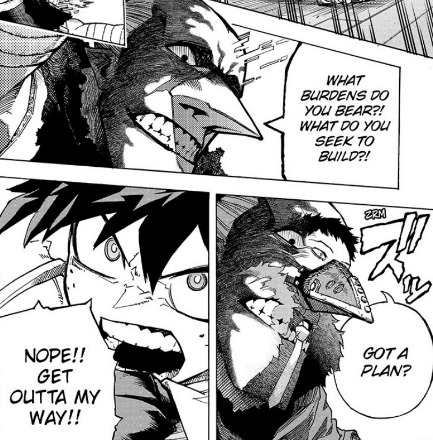
Judai is asked what burdens he has to bear and he has to meaningfull answer that question, Deku is allowed to get away with not having to think about anything. Deku remains superficial. Both Judai and Deku spend the entire arc running away from their villain rather than confronting them in any meaningful way. They both never express out loud any sympathy for their villain, or try to empathize. THey both never step down from the role of hero, and only confront their villain as a hero, because they don’t want to think about themselves as complicit or in the wrong. Shigaraki and Deku’s final confrontation mirrors Judai and Yubel’s but without the same clear framing. THe entire time Yubel is trying to get Judai to empathize with them, and Judai only responds with physical violence, because they don’t want to stop being the hero and because they can’t see Yubel as anything other than the villain. As soon as Deku arrives on the battlefield (by the way everyone else and their mom pointed this out, but Deku who doesn’t think OFA is a power for killing, is completely okay with a plan called the “Sky coffin plan” where every other hero was clearly trying to murder Shigaraki).
When Deku arrives he asks if Shigaraki is still in there, but he doesn’t do anything to try to reach Shigaraki, he jumps right to punching him. In fact he never tries anything besides punching him as hard as possible. How is punching Shigaraki with the force of a thousand suns saving him exactly? How is that different from how he tried to defeat Shigaraki the last war arc, before he saw the image of the crying child that made him want to try a different approach in saving Shigaraki? In Judai’s final fight with Yubel, it’s made explicitly clear that Judai is not trying to save Yubel, and that’s a fault on his part. In fact Judai gives the traditional “I have friends, and you don’t” speech to Yubel but it’s a subversion of how that speech is usually used. Usually that speech is used to show that the protagonist won because of they valued friendship,while the villain treated their friends poorly and only cared about power. However, it’s ironic in this case because Judai got all of his friends killed. Judai treats his friends like garbage. This speech isn’t used to show that Judai is winning because he values his friends more than Yubel does, it shows that Judai is a hypocrite, playing the hero in this situation where they are just as bad as Yubel. Judai’s not morally superior, he’s just lucky that he has good friends. Friends that were willing to save him. The only connection Yubel has to anyone else, Yubel’s only friend is Judai and Judai is a shit friend.
In fact, Mirio tries to give a version of the “You don’t have any friends” speech to Shigarkai, only for Shigaraki to get mad and tell Mirio that he does have friends and people he wants to protect.
This fact is also something that is blatantly ignored by Deku, even though Mirio tells him about it… even though we are told that Deku is trying his best to see the humanity in Shigaraki.
Judai blatantly admits they’re trying to kill Yubel. Which makes them a worse person, but a better character than Deku, because their actions are clearly framed by the narrative and consistent.
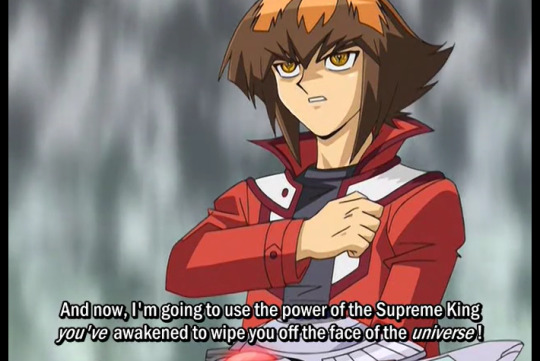
On the other hand we are told that Deku doesn’t want to kill Shigaraki, and yet everything Deku does makes it look like he’s just trying to kill Shigaraki and put him out of its misery. If we didn’t have Deku stating out loud that he wants to save Shigaraki and wants to see him as a human, there’d be nothing in his actions to indicate that he’s trying to avoid killing Shigaraki. Deku says he can’t pretend he didn’t see Shigaraki crying, but like, does he ever hesitate to punch Shigaraki, does he ever think that causing Shigaraki more harm is wrong when he’s already suffered so much? Deku says that Shigaraki is a person but does he treat him like a person? Does he try to talk to him like a person? To use avatar again, Aang does talk to Zuko pretty early on. Deku doesn’t even give the classic “We could have been friends under different circumstances” speech. When Shigaraki resists Deku’s attempts to see him as a person or emapthize with him, Deku’s response is to just resort to punching harder.
Which is in effect the same thing Judai does to Yubel, just kill them as a villain so they don’t hurt anybody else, but framed in an entirely different light. Judai is shown to be ruthless, and cold in his attempt to only settle the conflict with Yubel by violently putting them down. On the other hand we’re being told that Deku is compassionate and empathic while he punches Shigaraki with the force of a thousand suns.
There’s another eerie similarity between both of these final confrontations. At the climax of the confrontation, both Judai and Deku have a psychic vision where they see events from Yubel and Shigaraki’s childhood. This vision is supposed to help both characters understand the good in the villain they’re facing.
Let’s see the contents of this vision and how the visions change each character. Judai is shown a vision of his past life where Yubel sacrifices their entire body, and even their humanity to go through painful surgery to turn into an ugly dragon, all for the sake of protecting Judai in a previous life.
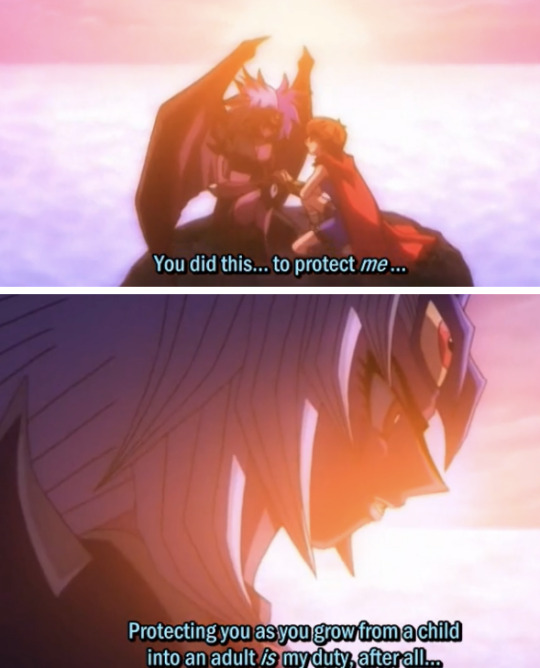
Judai is then forced to witness the good side of Yubel they’ve been ignoring all along to paint them as a villain. Yubel is simultaneously extremely selfish and willing to hurt people Judai cares about, but they’re also extremely selfless and will do anything to protect Judai and have made great sacrifices in the past for Judai’s sake. Deku gives lip service to not ignoring the humanity in Shigaraki, but Judai is literally forced to acknowledge the humanity in Yubel. Not only that, but Judai changes his behavior immediately after learning this new information. After seing the sacrifice that Yubel made for him in the past, Judai responds with a sacrifice of his own. A sacrifice that perfectly mirrors the sacrifice that Yubel once made for him. Yubel gave up their humanity for Judai, so Judai fuses his spirit to Yubel’s, becoming a human / spirit hybrid so Yubel no longer has to be alone.
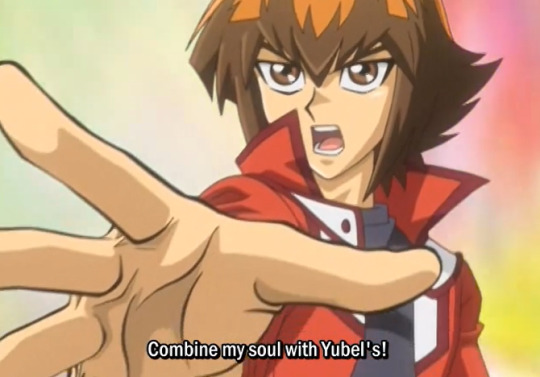
Judai also doesn’t just fuse their soul with Yubel’s in order to stop Yubel from destroying everything, it’s because both of them at this point need to atone together, and Judai is fulfilling his responsibility of watching over his friend until the end to prove that you care about them - as he said to Sho. Judai’s also fulfilling Johan’s dream of helping repair the bonds between spirits and humans, by reconciling with Yubel and repairing their bond. It’s also Judai atoning for his previous behavior of abandoning Yubel, by choosing to stay alongside them as they both atone together. Deku does sacrifice OFA during the fight against Shigaraki, but their sacrifice isn’t to help Shigaraki, but rather doing psychic damage to Shigaraki by using OFA is the only way to defeat them. He transfers OFA in order to break Shigaraki’s brain so he’ll stop reissting and Deku can beat him down. Judai fuses their soul together with Yubel out of empathy and a responsibility they feel to help their friend fater abandoning them, Deku transfers One for All to Shigaraki in order to hurt him and make him easier to punch. It's funny that Deku doesn't travel to Shigaraki's mind to learn more about him, but instead with the specific intent of harming him.
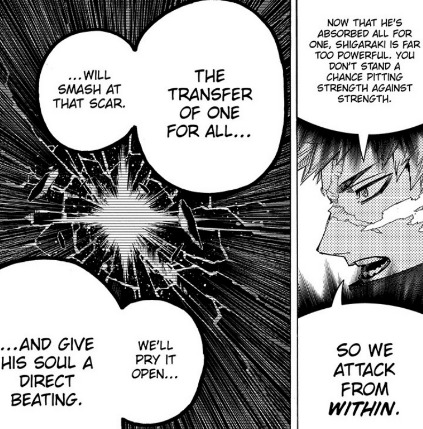
Once he's inside Shigaraki's mind, he doesn't take time to reflect on how Shigaraki used to stand up for bullied kids, or how he wants to be a hero to villains because no one else will stick up for the outcasts in society. No, he only care about Shigaraki when he takes the form of a child crying for help.
In the aftermath of the psychic vision Deku’s behavior doesn’t change towards Shigaraki in any way either. You could say he sacrificed his own arms in order to try to comfort Shigaraki within the depths of his own mind - but that’s not a real sacrifice either because his arms immediately come back. When Judai learns about the sacrifice that Yubel made in a previous life towards him, he stops seeing Yubel as an enemy and finds a way to resolve things peacefully between them. When Deku lanterns that Shigaraki’s a victim of All for One, and that his entire life was a lie, when he sees Shigaraki’s suffering first hand does his beavior twoards Shigaraki change in any way?
When he sees Afo has taken over Shigaraki’s body again, does he try to shout for Shigaraki, to tell Shigaraki to fight from the inside, to reassure Shigaraki that he’s still in there that there’s still good in him? Nope. He just punches Shigaraki some more.
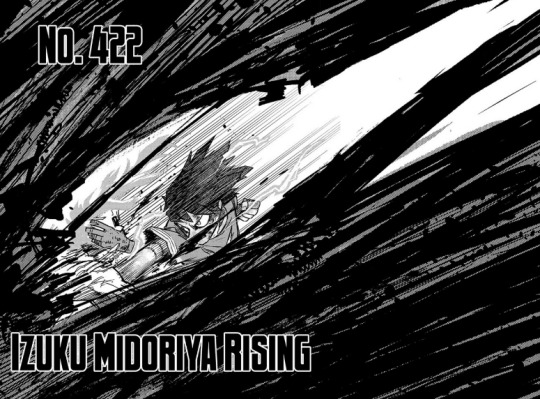
What Deku needed to tell Shigaraki is so obviously set up by the narrative too. Shigaraki wanted just one person in that house to tell him he could be a hero. Deku wanted his mother to tell him he could be a hero if he was quirkless. Deku sees that Shigaraki started out as a boy who wanted to be a hero, and who was manipulated into being a villain but does he try to appeal to the boy inside of Shigaraki by telling him he can still be a hero? Does he now see the good in Shigaraki? Nope, he just tries to kill him by punching him really hard.
I purposefully chose the images for the banner of this post, because it shows how differently MHA and GX treated its villains in the end. Yubel is embraced by Judai in the end, Shigaraki evaporates into dust.
"Judai, now that our souls have become one we will never be separated again. I have now been filled with your love and power. Let us fight together, against the wave of light leading this universe to destruction!"
Shigaraki could so easily have been given the love and empathy that Yubel was shown, but instead their life ends with no show of empathy from Deku, and with them dying believing that their long life of tragedy meant nothing in the end. Shigaraki realizes he's a crying kid, but he's never comforted.
Shigaraki: I only stole my body back from Master, and I didn't destroy anything. "In the end, I was just as you said... A crying kid, huh?"
Yubel is embraced and comforted, Shigaraki disintegrates into nothing.
One of these stories is apparently an optimistic story about heroes saving people, but it ends with the lifelong victim being killed in the most nihilistic manner possible, never receiving comfort, and never achieving anything with his long life.
The other story is a silly anime about card games, shows that when people are alone and suffering they can lash out and do terrible things. That all people are weak especially when they're alone, but the solution isn't to abandon them, or condemn them for their faults, but to believe in them and help uplift them the same way that Judai decides to uplift Yubel so they can atone together.
Which is why Deku gets an F in being a hero. Go directly to summer school. Do not pass Go. Do not collect $100.
#mha meta#ygo meta#mha 423#bnha 423#mha 423 spoilers#bnha 423 spoilers#izuku midoriya#deku#shigaraki tomura#tenko shimura#judai yuki#yubel#soulshipping#yu gi oh gx#yu gi oh
746 notes
·
View notes
Text








Hello :] Just an idea how Zum Zum could fit into Sebastian's narrative and how she could be used to tie in Mr. Lopee's involvement.
Presented as an A Hat in Time storybook because guess I am doomed liking the official canon ship of a noodle and his wife (The first page is a nod towards "The Tale of Queen Vanessa")
Storybooks don't come with dialogue, however just in case some stuff in the pages is unclear...
=======================
Fully story and headcanon explanation basically:
Sebastian and Zum Zum end up together in Urbanshade. I don't care how exactly.
Zum Zum gets infected by the Valcula Void-Mass. Urbanshade experiments ¯\_(ツ)_/¯ Due to its acid like trait, Zum Zum is now at the risk of dissolving (dying) to it, but the AD-E system ("Anti-Disgression Evaporation") keeps it from spreading and performing its dissolving process. Why Urbanshade not just killing her? Maybe she's the only one so far who survived the infecting procedure?
Maybe immediately, maybe some time passed, Sebastian causes the lockdown. And now tries to contact rival companies to not just get out, but also in hopes of one of them being able to help Zum Zum (and him).
Mr. Lopee steps into the narrative and offers Sebastian a deal. He can bring Zum Zum back to live in her original body once she died.
Sebastian agrees despite his goals being opposite to Mr. Lopee's (Not wanting the crystal getting retrieved vs. having the crystal being retrieved) and starts helping the player character (against his will) with the death screen and the pre-round shop.
=================
(╯°□°)╯︵ ┻━┻
Bonus:
(This is how storybook are viewed in A Hat in Time. The greatness of being a modder)
#pressure#pressure roblox#Sebastian Solace#Zerum#fishbun#Mr. Lopee#Sebastian pressure#Zerum Pressure#zerum x sebastian#habiart#pressure theory#storybook#tw blood
225 notes
·
View notes
Note
I have a bad habit of never finishing writing I start - I work hard on a story, make it to 3/4 of the way through, then lose passion for it and start something else. I know the key to overcoming this is discipline, and I’m trying very hard to make myself keep going with my current story that I like very much and spent so much time researching and outlining, but it’s a struggle every day to make my writing goal. Any advice for how to re-ignite writing spark or how to push through to the end?
We can lose our drive to write for a lot of reasons. It often indicates a growing maturity as an artist — you understand the craft better and your own (current) limitations better, and so you begin to feel overwhelmed in a way you didn’t before. It can also be that external anxieties are getting in the way or simply that you’ve lost interest in your current project.
Hope is not lost. Read on for some tips on reclaiming your writing spark.
Shift gears
Sometimes, all you need to reignite your writing spark is to engage your brain in a different way. If you’re struggling with your novel, take a break and try writing a poem or a piece of flash fiction. Or, you could try drawing sketches of your characters, a map of your story’s world, or some possible outfits for your climactic battle scene (it doesn’t have to be good. No one’s going to see it).
The trick is to stay creative but to approach your work from a different angle.
Change location
If you’ve been trying and failing to write at your desk, surrounded by crumpled up dreams drafts and last week’s candy wrappers, you may be suffering from an environment with stagnant energy. Try taking yourself on a writer’s date: go to a location that fits the tone of the project you’re working on (lux hotel lobby, seedy theatre bar, the wilds of a nearby park), and see if that gets your creative wheels turning.
Dress [in]appropriately
In Writing Down the Bones, Natalie Goldberg has a chapter called “Blue Lipstick and a Cigarette Hanging Out Your Mouth”. By this she meant, “Use outfits and props to step outside yourself and get a new perspective”. You might find it helpful to have a special “writer’s sweater” that you only wear when you’re writing or to dress like someone confident and cool enough to smash writer’s block in the face.
Do some soul-searching
What’s really going on here? If the above tricks aren’t doing it for you, there may be some bigger issues at play that are inhibiting you from connecting to your writing spark.
Write letters
I’ve written about the restorative powers of letter writing before, and I’ll mention it again: handwritten letters are a great way to get the words flowing. You don’t actually have to send them when you’re done (although you can if you want to); the recipient doesn’t even need to exist. Simply by putting your thoughts down in a low-risk way, you’re unclogging your creative pipes.
Join a writing group
There’s power and accountability in numbers. You can find writing groups online, through community centres and writers centres, or by sticking a flyer up in a bookshop and starting your own. There’s even a Novlr writing community on Discord where we share tips, struggles, and just generally talk craft! By inviting other people into your writing practice, you’ll have some support and encouragement to keep you going.
Find your writing spark with writing prompts
The internet is awash with writing prompts. These can be a helpful way to get something down on paper and stretch out your writing muscles. Whether it’s a premise, an opening line, or a character study, writing prompts can give you a gentle, creative push and even inspire new work.
Experiment with found structure
If writing a traditional story feels like pulling out your own teeth, try a found structure story. This means using fictional “found material” like shopping lists, calendars, to-do lists, ticket stubs, banking records, and so forth to create a narrative.
Here’s an example: Imagine a week in which a bride-to-be prepares for her glorious wedding, is left at the altar, rages in misery, and ultimately emerges healthier and stronger. Now, write her shopping list for each day of that week. How does it change from beginning to end? How much emotional detail can you communicate to the reader through the items that appear on these lists? This can be a fun way to create a story without the anxiety of writing it.
Set a petty life goal
I am a proud champion of the value of pettiness as a motivator. There are plenty of noble reasons to write: to share powerful stories, to help readers in need of healing, to inspire others to write stories themselves, and to draw attention to important social issues or minority identities.
There are also some really inane and selfish reasons to write: to become more famous than your ex, to appear on TV and make your ex regret everything they’ve ever done to you, to have your book made into a movie and receive casting consultation rights and pitch your favourite actor in the lead role and allow them to take you for coffee as a thank you. But the thing is… these are the motivations that are really going to pull you out of the dirt when you need it most. Find the silly driving goal that really gets under your skin and hold onto it for dear life.
Forgive yourself
Many writers experience a lot of shame when they aren’t writing as much as they feel they should. Needless to say, this shame only makes the writing harder. Allow yourself the space to take some time when you need it, process your struggles, and return when you’re ready. The page will be waiting when you get back.
#writeblr#writing tips#writers of tumblr#writing community#writers#writing#creative writing#creative writers#writing inspiration#writerblr#writing advice#writing resources#writers on tumblr#ask novlr#writing blog#helping writers
223 notes
·
View notes
Text
My Top 12 Favorite Anime of 2024 (and more)!
We had a lot of good anime in 2024, so here's the list of my top 12 favorites and some bonus great anime as well. If you get tired of clicking the review links, check out my anime overview collection for all of them here.
You can also check out my post about my favorite manga from 2024 here and my favorite books of 2024 here.
These are in no particular order!
Delicious in Dungeon (a.k.a Dungeon Meshi)
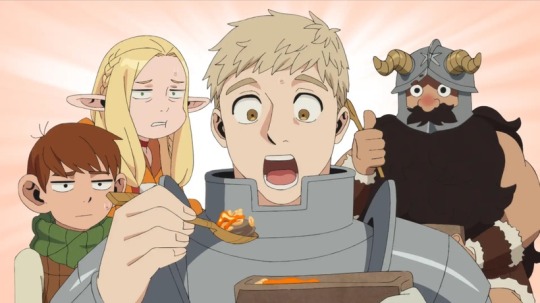
Dungeon Meshi is one of my favorite stories period, and easily my top anime of the year. The basic premise is that Laios and his party of adventurers need to travel through a monster-infested dungeon rescue his sister. Rather waste precious time earning money for food, Laios decides they should just eat the monsters they encounter as they travel. But then that simple plot spins off into so much more...
The story combines cooking and adventure animanga expertly. It has some of the most impressive and fascinating worldbuilding I've ever seen, top-tier varied character design and a great plot. It's also funny as hell, and I love its main cast of nuanced eccentric weirdos with all my heart. Even the characters who have five minutes of screen time feel like you could watch a spin-off series about them.
It's not just about food, but the cycle of life and death, about hunger of all kinds, about ecosystems and societies and finding solace in the monstrous...there's a lot simmering under this story!
So, go ahead and eat up! And read my review here for more!
Mayonaka Punch
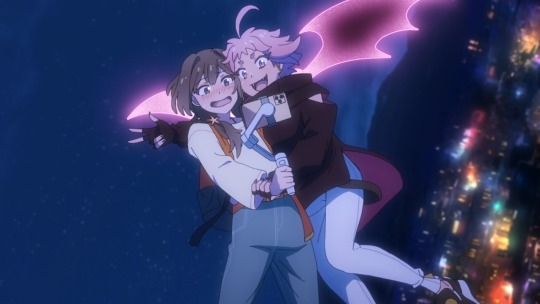
Canceled YouTuber, Masaki, meets a pathetic lesbian vampire, Live. Live agrees to help Masaki launch a new YouTube channel, but in exchange, Masaki has to let Live suck up all her blood when they reach 100 million subscribers.
This is the kind of stuff I watch anime for. This is what dreams are made of.
Do you support women's wrongs? Are you craving some women who are loveable shitheads? Do you want a great ensemble comedy about five disaster vampires wreaking havoc and a cynical human along for the ride? This show has all that, plus some down bad lesbian vampire shenanigans! But there's also a lot of growth for the main character, and the show has a lot of pathos in how it explores how the internet and its outrage train can do a number on one's mental health.
It's a ton of fun! See my full review here!
Magilumiere Magical Girls Inc.
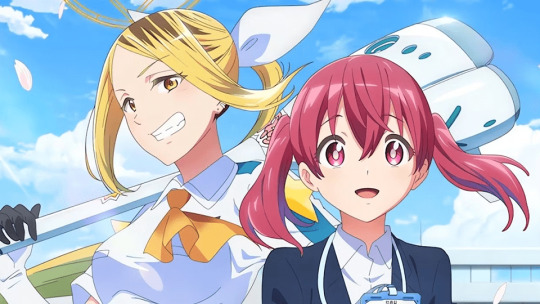
Being a magical girl is no longer the domain of teenagers, and has evolved into an actual career dominated by adult women. Kana becomes a magical girl for a scrappy start up company, and tries her best to navigate working life.
It's the magical girl story about adult women I've been craving for years! Magical girl media often explores the struggles of adolescence and growing up, and this show takes us to the next step by using magical girls to explore what it’s like to be a young woman entering the working world. The focus is one Kana struggling to grow her confidence and accept support from her workplace, but it also has a lot to say about companies exploiting their workers, prizing efficiency and growth over actually taking care of their customers, and it shows how the world could be better than what it is right now. Check out my review here for more detail!
Girls Band Cry
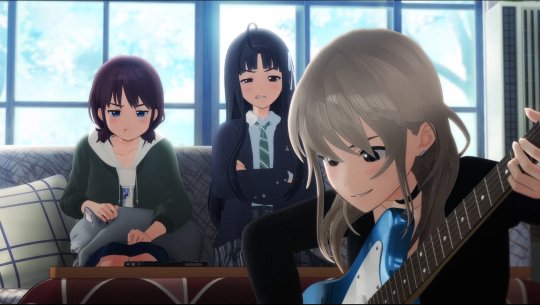
After being bullied, Nina drops out school and ends up starting a band with four other girls, including the woman whose music saved her at her darkest moment. Nina's determined for the band to stick it to the people who once looked down on them. GBC features some wonderfully messy and entertaining teenage girls, actually incredible CGI animation and great music. Nina, the lead, is allowed to be angry and obnoxious and powered by spite, but the narrative sympathizes with her and loves her spirit, even if she sometimes messes things up. All the girls have rough edges and raw emotion and a great dynamic with each other. They also flip people off a lot.
It was kind of screwed over by streaming, but don't sleep on it! See my review here!
Natsume's Book of Friends (Season 7)
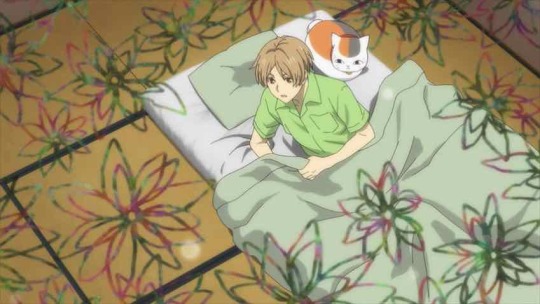
Anime's sweetest boy and his horrible cat (affectionate) are back, and it's time for more yokai adventures! I’ve already talked at length about how this series is special–check out my series review/ Rec post for the series here. I also did an article titled The Courage to Speak: Mental Illness and Recovery in Natsume’s Book of Friends that goes into more in-depth analysis. The story is sweet and charming and sometimes heartwrenching and very important to me.
It's yet another season of lovely, bittersweet yokai tales that tug on your heartstrings, the characters continue to heal and grow in slow but satisfying ways. It just feels so nice watching this series again and letting the love, comfort, and catharsis wash over me. See my review here.
Dead Dead Demon's DeDeDeDe Destruction
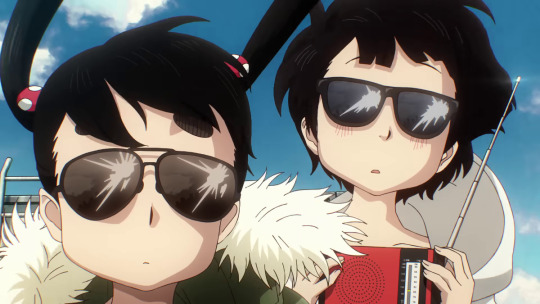
A giant mothership is hovering over Tokyo. The aliens have done nothing, not even leaving their ship, but Japan and America are already trying to blow that UFO up, and show off who has the best weapons, causing many civilian casualties along the way. Meanwhile, two girls are just trying to living their lives.
This anime goes hard on criticizing the military industrial complex, Japanese nationalism and imperialism, American imperialism, xenophobia, mistreatment of immigrants, rich people, and conspiracy theorists. That means it's often devastating and visceral, but it also follows some fantastic weird girls and their ride-or-die soul bond, as well as other charming, funny teenagers who are just trying to live in a world falling apart around them. You can also look forward to some plot twists that recontextualize everything you know!
You should also see my review for some content warnings and a really important message about episode order if you want more detail, you can read it here.
Senpai is an Otokonoko
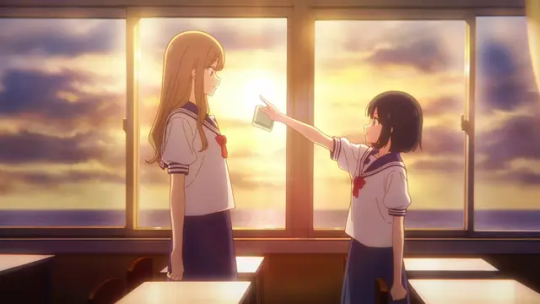
Makoto is an "otokonoko" ( a term that means crossdressing boy) and he's figuring out his relationship to gender, and hiding his interests from his mother. A girl named Aoi confesses to him, thinking he's a girl. But he reveals the truth, she's ecstatic about it, much to his shock. Meanwhile, Makoto's best friend Ryuji is also crushing on him...
It's tough to be a queer kid in a world full of rigid gender roles and insidious homophobia, and this anime shows the unfairness of that struggle. But it also shows the joy of finding those who accept and understand you, and of slowly becoming comfortable with who you are. The show knows how to make you really roots for these great kids, and it's really good at tugging the ol' heartstrings. See my review here for more!
A Sign of Affection

The anime follows Yuki, a shy girl who's been deaf since birth, and Itsuomi, a world-traveler and polyglot, fall in love. They both live in very different worlds, but as their romance blooms, they're eager to learn more about each other.
A Sign of Affection is shoujo romance at its sweetest, with soft colors, gentle blushes, tender moments, and plenty of warm fuzzies. The animation is beautiful and the show treats Yuki's perspective with care and delicacy as the story goes on. It also have a great focus on communication and consent in a relationship. Read my review here!
YATAGARASU: The Raven Does Not Choose Its Master
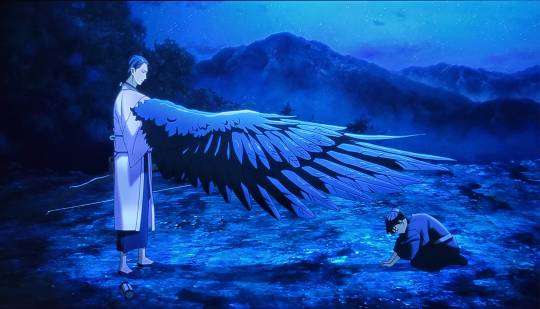
In this world, people have the ability to shapeshift into yatagarasu, the giant three legged ravens from Japanese mythology. Prince Wakamiya, who's next in line for the emperor, is thought to be an incarnation of the powerful "Golden Raven", so the four women chosen as his bride candidates (each who carry the hopes of their respective provinces) compete fiercely for his hand. Yukiya, a canny young boy, has been pulled into being the prince's attendant, and both Yukiya and the women soon find themselves pulled into a deadly web of mysteries and political machinations.
Yatagarasu is a tightly woven tale of political intrigue, featuring lots of palace folk plotting against each other, multiple assassination attempts, spies, fascinating worldbuilding and use of mythology, well executed plot twists, and complex characters. Yukiya is a very likeable little trickster with a heart of gold, and he works well as an audience surrogate who has to keep up with all this weird court drama. In the first half, the story focuses a lot on on women contending with rigid roles and how that leads to both enmity and empathy between them. But disappointingly, most of those characters are dropped or have their roles reduced in the second half of the anime, which is a shame.
Overall, this anime is a story that hooks you with it's story and it's dark, majestic atmosphere and never lets go. It's just plain good, and pretty underrated, so I'd suggest checking it out!
The Apothecary Diaries (Episodes 13-24)
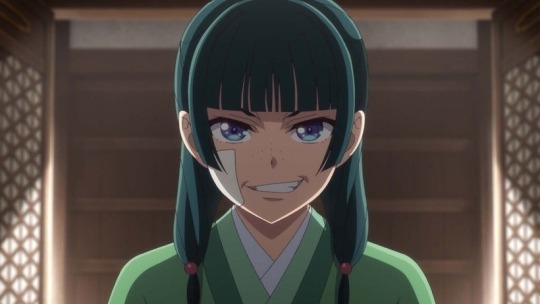
The second half of The Apothecary Diaries was somehow even better than the first half, crafting a compelling ongoing mystery and delving into MaoMao’s backstory. There were quite a few big thrills that made me gasp aloud. MaoMao, the world's best poison-obsessed detective, pulled off some show-stopping feats and she remains an incredible, endearing character. Especially now that we’ve learned she has a killer evil laugh. Check out my review of the first part of The Apothecary Diaries here and slightly more detail on this run of episodes here.
Dandadan
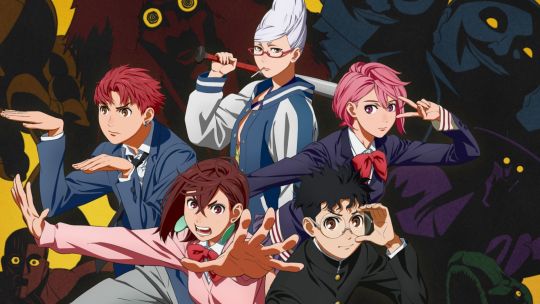
Another one you've probably heard of, it's the story of two kids- Momo, who was abducted by aliens and Okarun, who was cursed by a yokai. Now they have to break Okarun's curese while aliens and yokai are hunting them!
Dandadan is an anime bursting with absurd action and humor, and it has a boppin’ soundtrack and amazing animation from Science Saru. It’s wildly weird in the best way, and the characters are hilarious lovable losers. It's also the rare example of a battle shonen that actually treats its female lead as an equal to her male partner, in screen time and in battle. I adore Momo with all my heart- she's fun, she's bombastic, she's badass, she's everything.
However, the main problem I have with the show is its pattern of putting Momo in sexual peril. I go into more detail about this and the show in general in my review here.
Train to the End of the World
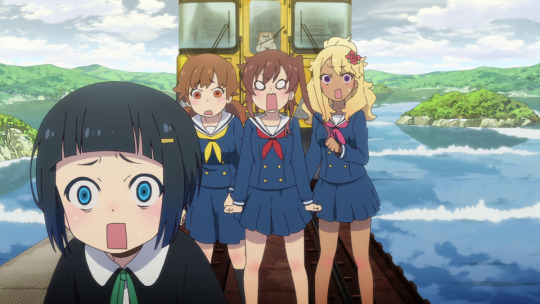
A story about four girls and a dog traveling across a weird, warped version of Japan to find their missing friend, Train to the End of the World is wild. I absolutely adore bizarre anime about equally bizarre girls, and this delivers. We see the girls encounter a cult with mushrooms growing out of their heads, screaming goatmen and even zombies on their journey. The dynamic between the different characters is great, and the dialogue is snappy. If you appreciate wild and weird zaniness that also has a lot of heart and great friendships, give this show a try. My full review is here.
Bonus Anime- some other stuff you might want to check out!
Cherry Magic! Thirty Years of Virginity Can Make You a Wizard?!

Despite an extremely goofy title Cherry Magic quickly became a surprisingly grounded, thoughtful and heartfelt BL romance worth watching. See my full review here.
7th Time Loop: The Villainess Enjoys a Carefree Life Married to Her Worst Enemy!
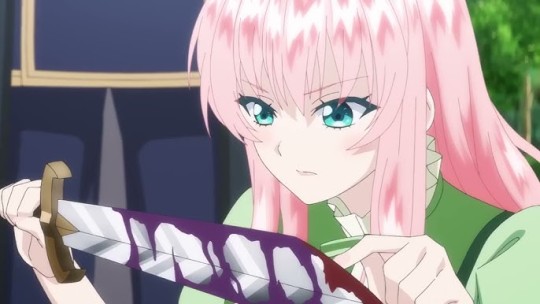
Rishe has lived seven lives, had lots of adventures, and in every single one of them, she has been killed as result of the world war started by the emperor of a neighboring kingdom. Each time Rishe dies, she's sent back to the moment the crown prince of her own country broke off their engagement (she's actually pretty happy about it). But in her seventh life, the future Emperor sees her, is instantly smitten by how cool she is and proposes to her. Rishe decides she might as well enjoy life chilling in the palace before things inevitably go to hell.
7th Time Loop has a fun conceit, and it features a vivacious, badass heroine who's a joy to watch. Having lived as a commoner in most of her past lives, she's ready to use her smarts to help people--whether it's going undercover to help a maid who's being bullied or addressing illiteracy among the servant girls. Whether she's beating up kidnappers or politically maneuvering, she's learning and growing and kicking ass. While her love interest is a bit too broody for me, I do deeply relate to how Rishe's badassery clearly turns him on. The antagonists and plot are sometimes a bit silly, but it's always a good time. A josei anime about an awesome gal is just what the doctor ordered.
Acro Trip
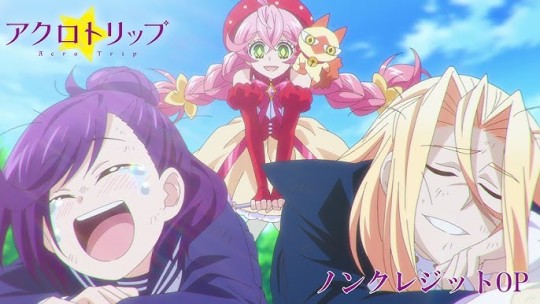
A silly show about a magical girl fangirl who's recruited to an evil organization by an incompetent villain, Acro Trip is a lot of fun, and I recommend it to any magical girl enjoyer. I also recommend it to anyone who loves pathetic failguys and girls. Our "villain" Chrome is the most hilariously pathetic of them all. You like bad boys? Well this man is literally bad at everything. See my full review here.
Whisper Me a Love Song
I have to give a shoutout to the only textual yuri anime that came out this year--it's production basically completely collapsed, but it's still watchable and the story is a sweet and solid girl band romance. At least consider giving the manga a shot if nothing else! See my review here!
#year in anime#anime overview#2024 anime#dungeon meshi#delicious in dungeon#girls band cry#mayonaka punch#magilumiere magical girls inc.#magilumiere co. ltd.#natsume's book of friends#natsume yuujinchou#dead dead demon's dededededestruction#dead dead demon's dededede destruction#senpai is an otokonoko#yatagarasu#a sign of affection#dandadan#train to the end of the world#the apothecary diaries#acro trip#cherry magic#whisper me a love song#7th time loop#magical girls#mahou shoujo#yuri#natsume yūjin chō#long post
163 notes
·
View notes
Note
Hiiiiiiiiiiiiii
Do you take rec requests? If so, can I ask for your recs for Obi Wan centric fics where Obi Wan is just absolutely adored by everyone around him? Like people love him, think he's great, beautiful, talented, etc. you could also include fics where Anakin isn't one of his adoring fans but he comes around eventually. If you've ever read the Shoulder The Sky series by @kcrabb88 ? Where Anakin is kind of weird about Obi Wan in the beginning but he'd die for him at the end? Yeah like that.
Preferably no Obitine please, and also no order 66, if you would. They can be fix its or maybe they just don't get to order 66 in canon. Long and short is fine. I just want to read fic to justify my absolute rabidity over Obi Wan Kenobi.
Yknow if you're going to answer the ask? Might as well include every fic that you know that portrays Obi Wan very well. Whether everyone thinks so or not, I just want an excuse to fangirl over Obi Wan. Whether it's cute adorable initiate obi wan; smart skilled Padawan Kenobi, best master in the galaxy Kenobi, best general in the gar Kenobi, unfuckwithable Kenobi that everyone knows not to piss off, the Jedi's best member, whatever. Just fics of obi wan being great, whether people acknowledge it and love him, or acknowledge it and go still like prey animals when he looks at them
Hi! Oh, this is going to be a bit of a difficult set, mostly because avoiding Order 66 is a tough one, and I'm not sure how you are with various Obi-Wan pairings (which tend to have some good Obi-Wan fic), but I can at least start you out with a few recs sets I've done that have a lot of Obi-Wan fic and hopefully the Order 66 fic will be pretty avoidable.
My Star Wars fic recs tag (pretty much anything that mentions Obi-Wan in the subject will treat him well)
Obi-Wan Kenobi epic fic
Post-OBW's first two episodes-centric set
It's hard because some of my favorites:
Reprise by Elfpen (absolutely epic time travel fic that does the really good, hard work of showing us the timeline shifting and why it has to be done in baby steps)
Fire and Ice by Yesac (set in an AU where Order 66 happened, but Anakin won the fight and took both Obi-Wan and Padme hostage, and it's about the incredibly long road to recovery from there, which does have some love = attachment minor, minor notes, but has an Obi-Wan characterization that was fundamental to how I see the character)
Aren't necessarily about Order 66, but it does happen in both those fics, as something that's either being avoided or fixing the aftermath of them, and I'm not sure where you stand on such things, since you don't want Order 66. Same for
The Desert Storm by Blue_Sunshine (time travel AU where Order 66 happened in Ben's timeline, but not in the one the fic is set during)
Knightrise by deviantaccumulation (this one includes Order 66 happening on-screen, but it's an AU where more Jedi survive and they go into hiding together to rebuild)
where it's time travel to fix things, is that still over your line? Is it about the other characters that love Obi-Wan or the narrative of the story that loves Obi-Wan, because that would change a lot of the recs I make! Not that he's unloved in them, but Cataclasm by dendral is one of my favorites, but it has Obi-Wan off on his own a lot of the time, so the narrative loves him, but the people around him aren't in the room with him, etc. I also have a Jedi culture set of recs, which you can scroll through to find Obi-Wan mentioned in the summary, it's probably going to be about how much everyone loves him. But some good places to start for you would be:
ruth baulding's Lineage series and then her Legacy series. The first series is an epic length run of adventures when Obi-Wan was a padawan with Qui-Gon, and then the second series is his time teaching Anakin, with more adventures
Remedial Jedi Theology by MarbleGlove, a fantastic look at Jedi theology, philosophy, and interaction, with Obi-Wan in a prominent role.
Supreme Chancellor Obi-Wan Kenobi stonefreeak, which is crack treated seriously, very Jedi-positive, and while it's an ensemble piece overall, Obi-Wan is very much at the heart of the story and the focus will always come back to him. Just so much fun and very soft on the heart, this is a universe where everything goes right.
Tano and Kenobi by FireflyFish, which is a time travel fic where Ahsoka goes back into the past and becomes Padawan Obi-Wan's Master instead of Qui-Gon. The fic is kind of harsh on Qui-Gon, but if you love the disaster lineage or if you just want more Obi-Wan & Ahsoka, this fic will scratch the itch so good.
Unexpected Awakening (The Rewrite) Rhiw, another time travel fic where Order 66 did happen, but the fic is about Legends!Obi-Wan taking a different path from what happened in the first Jedi Apprentice book, instead of becoming Qui-Gon's Padawan the way he did in canon, he and Bruck go to Bandomeer and then get wrapped up in an epic story about Obi-Wan slowly changing the galaxy's course.
walk by faith/tell no one what you've seen by Killbothtwins, which is time travel with Obi-Wan after the end of the galactic civil war (the one against the Empire) going back to his 12 year old self and diverting the timeline, with a really great voice for Obi-Wan's character in this fic.
The Uses of a Sandwich by Laura Kaye (laurakaye) is a fun young Padawan Obi-Wan fic where he meets Qui-Gon's first apprentice and has a great sense of comedy.
Uncle Ben and Little Luke by phoenixyfriend which is de-aged!Luke and suddenly alive again!Obi-Wan and is just so much fun for a dynamic that doesn't get enough fic. (NEVER ENOUGH.)
Well Met by avocadomoon is one if you don't mind Obi-Wan/Padme fic, where they develop a friendship and later in life just slowly fall into a relationship, where it's about discussions and politics and philosophy and worldbuilding, it's such a subtle dynamic between them in a way that felt so natural to me. I also enjoyed the author's other fic Anamorphosis just as much, too.
177 notes
·
View notes
Note
how scary is the silt verses? i want to get into it bc you're saying so much good stuff about it, but i had to stop listening to the magnus archives because it was keeping me up at night :(
hmmmmmmmmmmm I have to think about this a little bit, because scariness in podcasts doesn't bother me much so it's entirely possible for there to be Some Great Horror I'm just not thinking of.
Relative to TMA! I'd say The Silt Verses horror elements are less frequent than TMA, considering the TMA format is to tell One Fucked Up Story every single episode. The Silt Verses does not have that format so it can go episodes at a time digging through the narrative.
But it does have horrific things that pop up which could belong to a TMA episode. A Deer That's Wrong, fishermen sewn together into a fucked-up boat thing, whatever body-horror Val does to people. I do think the flavor is different from TMA. A lot of those TMA horrors are from the perspective of normal civilians, unwillingly subjected to A Horror. In TSV, most everyone encountering The Horrors is ready to start punching. But still like... The Horrors ARE very much there, and part of it.
Though, there is a flavor of horror in TSV which I don't think is very prevalent in TMA, which is this "you're about to be killed and everyone in society is okay with this, actually" style of horror. There's a plot point where a company which is, essentially, going through lay-offs, is allowed to kill the people they're letting go as part of a sacrifice. And the POV character (who is not being laid off) is experiencing this whole thing going "this surely can't be right. they surely can't?" But they do, and she's complicit.
So... yes...! TSV is scary! But it's a kind of scary which is more baked into the society the characters are navigating, vs. the TMA-style "spend every episode one a different Horror Incident that happened"
147 notes
·
View notes
Text
Can I talk about sugar for a second? Like all of the berzatto children are tragic and doomed by the narrative in their own right, but nat’s story means so such to me idk if I can even fully talk about it all. We see her relationship with her mom is strained at best, it seems like she’s the least favorite child, maybe BECAUSE of her existence as a woman.
And then we find out that her lifelong nickname is based off of a childhood mistake, her being overeager to help her family literally turned into a lifelong reminder of her fuck up. Is there anything more tragic?? A child wanting love but getting scorn?? And then it makes the flashback scene where she tries to add raisins in season 1 all the more upsetting because why did she add them?
“That’s how mom makes it.” she’s the only one that still follows their mom’s recipe. The reason? Could be anything. But I have no doubt in my mind if she DIDN’T add the raisins if Donna had been around she would’ve been ridiculed even more.
I have such a soft spot in my heart for girls and their complex relationships with their moms and motherhood, and it makes her scene with cicero in the car that much more impactful. When cicero says he would let his kids make more mistakes and not been as careful, i almost started crying. Nat has a nickname from her mistakes and it seems like in her mom’s eyes she’s nothing but mistakes. And then her uncle tells her that she’ll be a good mother and that it’s okay for kids to make mistakes, great, even.
I’m so happy nat is in a place where she’s happy and supported. She has a husband who deeply understands her family and doesn’t judge her for it, even making an effort to try and include Donna. I was kind of meh about pete before season 2, but it solidified for me that he’s so so good for nat and a great character. He is so excited to be a dad, he’s patient and kind with her and her family, and he doesn’t call her sugar.
She’s nat. And she’s allowed to make mistakes.
#I have so many fucking feelings about them#maybe it’s me coming off of the high of succession’s equally emotionally damaged sibling trio#but I have nothing but love for natalie berzatto#she means so much to me#she’s joining the ranks of women on tv that are hated by their mothers just for being born a woman#my baby girl#I love her so much#the bear season 2#the bear#natalie berzatto#pete the bear#carmy berzatto
2K notes
·
View notes
Text
Here's the realest take on SonAmy you'll read:
Spoilers, Im not against it, despite being sonadow shipper:
The reason most people (or maybe just me) don't like Sonic X Amy is because it's not often done in a believable way or it's the "boy shifts their morals/goals/personality after finding the girl" which of course ends with one of them having no character at all, until it's convenient for the plot.
All fandoms tend to hate love interests because they often halt the plot and story for the sake a overdone cliches rather than working with their blooming interest, because they can't admit they need a second writer/team to help.
I could see Sonic not really knowing what to do if Amy shows interest in him, oblivious but cute-- If they can make it feel genuine that's great! But damn, I really pray we don't get this:
"oh no, he likes her, now it's just you and me knuckles. Let's either fight the badguy by ourselves and lose or we should try to stop their affections. Or, 3rd choice, sonic is too busy with any to help us and we don't talk about it because we don't want to get in the way and so we get angry and he doesn't seem to notice.
Either way it will cause a rift in our friendship until Amy somehow fixes it by being cool, and then we will like her after that and all be friends."
In defense of the Movie and my guesses:
Sonic has never been very romantic and that's what Amy seems to crave the most so it always feels like one of them has to change dramatically to fit the cute couple narrative in the fandom... BUT the movie sonic isnt the same as the game/sonic x sonic. No one is.
I think Sonic and Shadow would be able to grow from each other more, related deeper, but they could easily make them like brothers and I'd be okay with that. I'm not against Sonic X Amy.
Given how they introduced her, I could see Sonic being impress by how seemingly badass she is to him, and that starts it. Sonic definitely seems like he'd be the type to be in denial that he likes her.
My guesses:
He might honestly go on an adventure in time without anyone, ending with shadow needing to save the day with Sonic's friends. That would be awesome tbh. If Amy comes back with them, they might even have a mini series with some father son moments about dates or something.
I hope at some point we get a Chaos or Iblis trigger type situation, maybe in the post credit. Given they're doing sonic CD/time stuff, I'ts easy for them to bring in silver (or maybe rouge and GUN steal the emeralds in order to "keep them safe" only for it to fall apart. Hell, maybe Rockwell teams up with Stone or just turns GUN into another version of Robotnik land. Without sonic to protect everyone, we see what happens in the future.
I think it would be funny as hell if they made everyone mad and she fell for shadow instead hahahahah
#sonic the hedgehog#sonic 4#amy rose#sonamy#sonic x amy#shadow hedgehog#sonic x shadow#shadow#sonic#sonic movie#sonic movie universe
88 notes
·
View notes
Text
This Week in BL - Weird Strange Warmth, Thailand
Organized, in each category, with ones I'm enjoying most at the top.
Sept 2024 Week 2

Ongoing Series - Thai
Jack & Joker (Thai Mon IQIYI) ep 1 of 12 - Oh it’s fucking great. What a fantastic start! It’s a fun cast too. I adore seeing all of the familiar faces. This is a lot more fun than Kidnap (sorry GMMTV, do better). I mean both shows are serving the same kind of concept but with completely different energy. I love that War is playing phi in this series. I think it suits him much better. In fact. I really like these rolls for this pair. I think they’re gonna knock it outta the park. I am so happy this is good. I wanted it to be good. And it’s good!

Monster Next Door (Thai Thurs Gaga ) ep 8 of 12 - Oh no! He read the journal. No snooping! Well I guess they needed to get some tension for these 2 from somewhere, otherwise they are too good to each other. Meanwhile, I’m not sure about the sides in this particular series. I don’t hate them. The laundry jealousy moment was pretty well done. But I'm not sold, either.
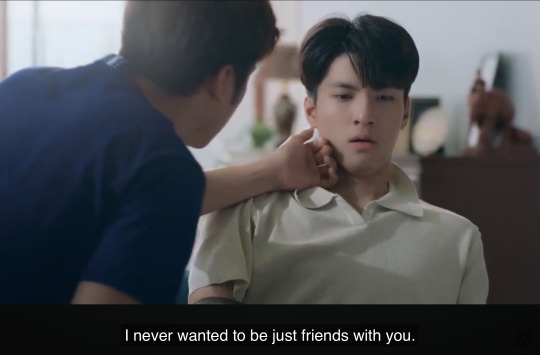
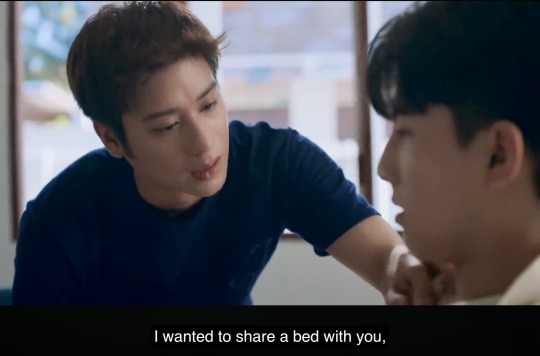
Addicted Heroin (Thai Tues WeTV) ep 5 of 10 - I forgot that we were already on the ICONIC kidnapping section of the narrative. I miss Gu Hai's OBEY sweatshirt from the original. (Someday I will own that sweatshirt.) Hero should at least be wearing an OBEY T-shirt. Frankly I miss the harshness of the original too. Johnny Huang was just so massive, August doesn't have the physicality to carry this scene off. Nor does Thailand have the guts to push it into the creepy obsessive territory that made the first version so thrilling to watch.

The thing about the original kidnapping bit was we could feel Gu Hai's vibrating need to possess overriding everything else (including his sense of humor and frustration with himself). Gu Hai KNOWS kidnapping was an over reaction, he KNOWS he is being absurd, he just doesn't care. Because he doesn't just want to fuck Bai Luo Yin he wants to consume him.

We didn't get any of that from Hero. Hero, as a character, just isn't edgy enough to carry off a kidnapping, he's been softened too much in this new Thai form.
And then... An around the back of head not-kiss? Interesting choice. (Checks to see if BoomPeak are hanging out nearby.) Is that because the actor is under age? We in that head space for this whole show? (Pun intended.) Not sure how I feel about any of it.
It’s a much milder confession this time around, because it’s Thailand, but it’s still warped. So I’m still here for the weird strange warmth of this damn show. I did laugh a lot during this episode.
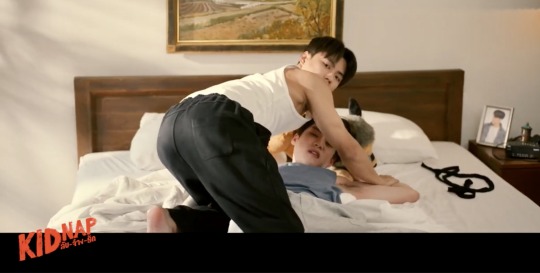
Kidnap (Fri YT) ep 2 of 12 - Oh I am very much enjoying this.
"You’re the worst kidnapper I ever ever met" is an apt accusation.
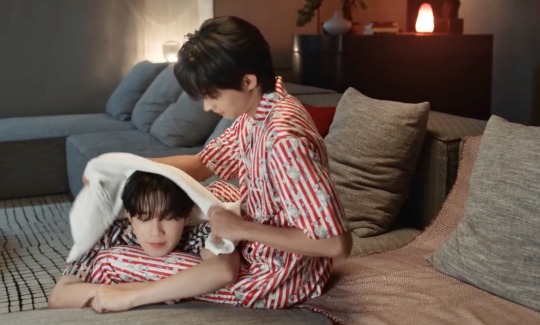
Battle of the Writers (Sun YT) ep 7 of 12 - I kinda enjoyed the little side romance story (wealthy writer intellectual + poor local salt-of-the-earth boy = Love Seaing all over my damn screen). It came outta nowhere but... okay.
I honestly have no idea what’s going on with this show. But the kisses are nice. And I pretty much like all of the couples. It’s wild how disjointed it is but simultaneously how pretty. It’s like Star Hunter got hold of Mame’s budget and aesthetic.
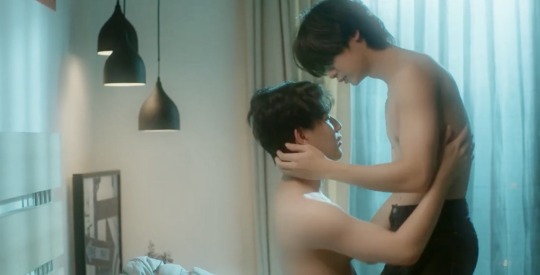
I Saw You in My Dream (Weds Gaga) ep 9 of 12 - Boyfriend era to the max. Production is still ignoring the whole "dreaming the future" POINT OF THIS SHOW.
The Trainee (Sun YT) ep 11 of 12 - Jane is VERY COOL. Like tay-style cool… as it were. I like their dynamic when they're given one to play with. It’s the rest of this show I don’t enjoy.
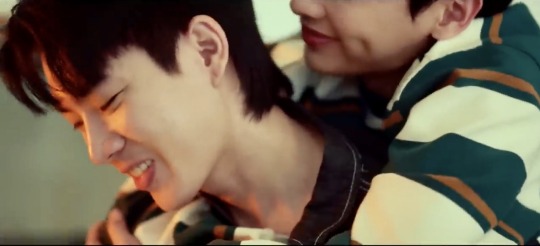
Live in Love (Sun Gaga) ep 2 of 5 - It cute. Bit odd but cute. I like the language play, of course. It’s an interesting pair to watch flirt because it’s all language play so that's fun but otherwise, I'm not convinced.
Ongoing Series - Not Thai
The On1y One (Taiwan Thurs Gaga) eps 7-8 of 12 - This BL doesn’t drink from the water bottle to show off its neck. It quietly hands you the water bottle and expects you to understand that is not an act of generosity but of polite distancing. It's about the delicacy of the messaging, and the way themes are conveyed with such nuance.

This story is entirely about the two of them figuring out about each other, and then trying to be what the other person needs based on that information. It means they (and therefore we) are on this journey of discovering affection together. It's brilliant.
I must talk about the physical acting of these two for a second. That scene where they’re fighting over the book and then fall into the pool. That was one take. That’s amazing. These two are really fucking stellar not only at acting but hitting their marks. And let's be clear, that is NOT the same thing. I bet they both have stage training.
Define irony: watching two abandoned kids counsel their respective parents through abandonment issues.

Sugar Dog Life (Japan Sun grey) ep 6 of 10 - It is stupid cute and utterly charming. They are total boyfriends. It’s just that one of them wants to be and one of them assumes they already are. Actually, nevermind boyfriends, they’re married.
I Hear the Sunspot AKA Hidamari ga Kikoeru (Japan Weds Gaga) ep 12fin - It made me whimper a lot because they’re both hurting so much. But in the end it was... fine.
Summation
The compassionate story of a college kid going deaf and the one boy he can hear. I love this manga and was let down by the first adaptation (Silhouette of Your Voice), so I was expecting a lot from this BL. I expected the soundscapes in this one to be fantastic, and the were, but I didn’t expect the filming to be something special too. But it really is. The acting is great too. But the story? It was just fine. They spent far too much time on the build to a relationship, then wallowed in their separation and a problematic girl character, when they should have been showcasing Taichi's character arc and his capacity for connection. Perhaps Japan should pass this one off to Thailand, It's a soft story centering on "food as love" so they might do better with it. I am, yet again, disappointed. 8/10 but I want to give it a 7/10

First Note Of Love (Taiwan Mon Gaga) eps 9-10 of 12 - It’s fine. it’s cute. I enjoyed getting some backstory. More of the sides, please.
Seoul Blues (Korea Fri? YouTube) ep 7 - Honestly, why don’t they just call this entire series The Cheating Diaries and have done with it? I’m only watching it because there’s basically nothing else from Korea right now. But I’m generally mad about it. Including the fact that everybody is so pretty and the acting is so good in the series, but the stories are so terrible.
It's airing but...
The Hidden Moon (Sat WeTV) ep 1 of 10 - This is a supernatural romance (my ghost boyfriend trope) by Violet Rain (I Feel You Linger). A man is hired to write an article about an old mansion in Chiang Mai being converted into a café. He sees the ghosts of people who died at the mansion, falls in love with one of them. Was substantially recast. I loved IFYLITA except the ending so I think I'll let this one run it's course you can tell me if it's work tracking down... if they managed to land it. I have my doubts.
Happy of the End (Japan Tues Gaga) - A boy is disowned for being gay, dumped by his boyfriend, and ends up in a dysfunctional co-dependant relationship with his would-be kidnapper. We were due for another messy JBL and it's exactly as expected. I do not like it at all. And ya know what? There is plenty airing. DNF

In case you missed it
The Time of Fever (Korea iQIYI & Viki) 6 eps - Side couple from Unintentional Love Story, HoTae & DongHee, return for a spin off backstory show.
It started out fantastic. And it was a relief to have a good Korean BL finally back on my screen, even a high angst one. But I did spend a lot of time trying trying to figure out whether they’re going to rehash or reboot from the previous series. Are we in Between Us territory or Don't Say No or (heaven forbid) To My Star 2?
None of the above, it turns out.

This was a pure prequel about lost first love. As such, it has no real finale beyond what we got in ULS. Which, for this pair, wasn't satisfying. Putting my disappointment over this aspect aside, it is enjoyable on the strength of the characters, actors, and chemistry (if not story). Yes I said chemistry, the kissing is fantastic, sometimes KBL can do that. This one featured the "teach me to kiss trope"!!!! Plus language play. Both favorites of mine. It is all angst, ache, repression, and miles of subtext. It did fudge the ending by not skipping forward and over the events in ULS to depict what happened next (what, no year long time jump when we actually need it, Korea?) It's a worthy companion piece, but should be watched BEFORE ULS for maximum satisfaction, and even then you're going to be left feeling like HoTae & DongHee's relationship was never adequately discussed or depicted in order to achieve resolution.
The little cameo of my baby in ep 5 was much appreciated. But the motorcycle should’ve been set up a little bit more. Of course I wanted it to be about them getting together after the events in the first series. But this was all backstory from start to finish. And while it was good backstory, it wasn’t ultimately satisfying for these characters. Still it’s a good little series. 8/10
Meet You at the Blossom (China) - I'm eating crow, binging the fucker, and live blogging. It's just taking me some time. This isn't really a bingable show, not for me anyway. It's A LOT to take all at once. No new one this week.
4 Minutes (Gaga) Ended - Spies reported in to say the ending was not-exactly-unhappy and mostly lackluster. I'm torn over whether to watch. My natural disinclination to binge, meets my dissatisfaction with wishy-washy, is going up against my love for fabulous high heat and pretty pretty men.
Mitsuya-sensei no keimakutekina ezuke finished and it’s reported to be solid. Age gap treated with respect. I'm curious, so I'll check it out. Not doing very well on binging and catching up but it's on the docket...
Next Week Looks Like This:

Upcoming BLs for 2024 are listed here. This list is not kept updated, so please leave a comment if you know something new or RP with additions.
Still Coming Sept 2024:
9/15 Love Sick 2024 (Thai Sun iQIYI) 15 eps - Remake of the original. I'm scared too.
9/15 Bad Guy My Boss (Thai Sun Gaga) 10 eps - Assistant to a player boss who is in love with that boss decides to quit to save himself. The boss then makes a move. (A gay What's up with Secretary Kim?)
9/17 Love is Like a Poison AKA Doku Koi: Doku mo Sugireba Koi to Naru (Japan Tues Netflix?) 10 eps - Lawyer and a con artist meet at a bar, pair up, fall in love.
9/28 Teenager Judge (Vietnam Sat YouTube) ?? eps - oh I don't know just Ba Vinh doing his thing with pretty boys again.
THIS WEEK’S BEST MOMENTS
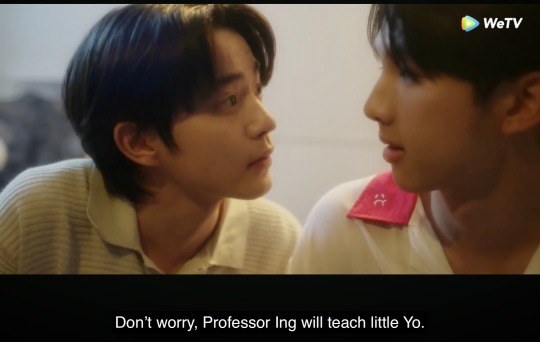
Love a teach me to kiss, teach me to fuck, whatever moment. (I Saw You In My Dreams sides)
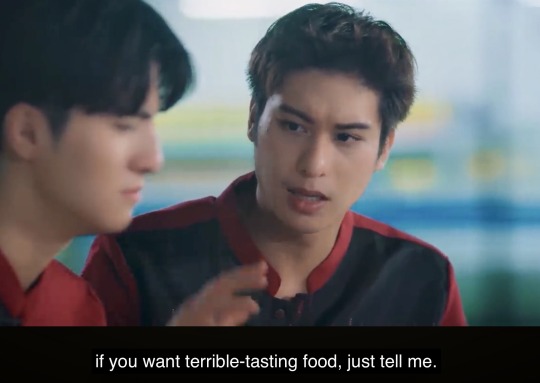
Not gonna lie. I laughed. Addicted.
(Last week)
Streaming services are listed by how I (usually) watch, which is with a USA based IP, and often offset by a day because time zones are a pain.
The tag BLigade: @doorajar @solitaryandwandering @my-rose-tinted-glasses @babymbbatinygirl @babymbbatinygirl @isisanna-blog @mmastertheone @pickletrip @aliceisathome @urikawa-miyuki @tokillamonger @sunflower-positiiivity @rocketturtle4 @blglplus @anythinggoesintheshire @everlightly @renafire @mestizashinrin @bl-bam-beyond @small-dark-and-delicious @saezurumurmurs
Sigh, Tumblr in its infinite wisdom doesn't like too many at-ings.
#this week in BL#BL updates#The Time of Fever review#Jack & Joker#Jack and Joker#Addicted Heroin#The Traineee the series#Monster Next Door#Sugar Dog Life#Seoul Blues#I Saw You in My Dream#I Hear the Sunspot review#Hidamari ga Kikoeru#The On1y One#First Note of Love#Live in Love#Kidnap the series#upcoming BL#BL news#BL reviews#BL gossip#Thai BL#Japanese BL#live action yaoi#Koren BL#BL starting soon#BL coming soon#new BL
168 notes
·
View notes
Text
How to Write a Character
For creative writing to have as deep an impact as possible, you need to give the reader strong characters they can relate to on a personal level.
By borrowing from tried-and-true character archetypes and giving them your personal spin, you can create heroes, villains, and sidekicks that will affect your readers as if they were real people they knew.
Come up with a backstory
Crafting a backstory can help you flesh out an interesting character profile.
“When I’m dealing with characters,” says legal thriller author David Baldacci, “and I’m trying to explain somebody's situation and motivations, you have to look into their past, because [the] past always drives motivations.”
Ask what experiences your character had in elementary school or high school that shaped who they are today. Your character’s backstory can greatly inform your plot.
Develop a character arc
A character must evolve throughout a story.
“The character has to change,” insists crime fiction writer Walter Mosley. “The character doesn’t have to become better. The character doesn’t have to become good. It could be the opposite. He could start good and become bad. He could start off hopeful and end up a pessimist. But he has to be impacted by this world that we’re reading about.”
Plan out your storyline based on your character's goals and how achieving or not achieving them will change them as people. This sort of template can help anchor your narrative.
Do research
If you plan to set your story in a specific locale or period, do enough research to make your characters seem true to life and believable.
“What does it mean, for instance, in the Tudor era to be a male person?” asks Margaret Atwood, author of The Handmaid’s Tale. “What does it mean to be a female person? What do those things mean when they’re at different social levels?”
Empathize with your characters
No matter what the type of character you’re developing, try to find some reason you and your reader can relate to their internal conflict.
“You’re living with these people every single day for months at a time—in some cases, years at a time,” says acclaimed children’s author Judy Blume. “You had better feel for them. So, for me, yes, I have great empathy for them.”
When people can empathize with characters, they’re more likely to find them compelling.
Experiment with different approaches
If you usually write characters from a particular point of view (or POV), change things up to challenge yourself.
“Write about someone entirely through the eyes of their friends and family,” suggests journalist Malcolm Gladwell. “So do a profile of someone where you deliberately never talk to the person that you’re profiling.”
There are plenty of ways to craft compelling character descriptions—free yourself up to try new alternatives.
Give your characters flaws
To craft believable characters, you need to give them flaws.
“One, it makes the characters human, just by default, because everybody recognizes that we all have flaws and mistakes,” David says. “But two, it gives you plot elements and plot opportunities because somebody makes a mistake. Why? Because they’re flawed.”
Learn from real people
Pay attention to real people’s mannerisms, personality traits, body language, and physical appearances.
Do research, and be respectful, when you want to write characters with backgrounds that you are not familiar with. Become familiar with different people's cultures, sexual orientations etc.
Talking to people about their experiences will help form your character’s personality.
Let your characters surprise you
Character development can proceed down a host of different avenues.
“Spend a lot of time with your characters and getting to know them,” Judy suggests. “And the way that you get to know them can be different from the way I get to know them. But my way is: They don’t come alive until I write about them, until I put them down on paper.”
As you write, your character’s motivation or perspective might change from what you originally planned.
Play characters off each other
Ask yourself how a secondary character’s personality might thwart the main character’s motivation.
“One of the best ways, as I said, to develop a character is to put that character in relationship to another person,” Walter says. “So as they talk, as they fight, as they work together, we find out more about who they are and what they are.”
The character’s close friends, adversaries, and acquaintances might all have different effects on their behavior.
Take an organic approach
Over the course of the story, be ready for your characters to surprise you as much as the people you know in real life might, too.
Your characters may take on a life of their own.
Avoid static characters by letting yours have their own lives and personalities. Let their stories take you where they lead.
Source ⚜ Writing Notes & References ⚜ Writing Resources PDFs
#writeblr#character development#writing notes#fiction#booklr#dark academia#light academia#creative writing#studyblr#lit#original character#on writing#writing prompt#writing advice#writing tips#writing reference#writing resources
967 notes
·
View notes
Note
A big part of Eureka is splitting the party. Normally games are loathe to do this because of the potential to bore players while they passively watch others play the game. I'm curious how you deal with this when you run Eureka. Sending players away seems like it could make it either better or worse. Like if it's at a home, people can go hang out by the snack table and drink and chat, but that doesn't work as well at, say, a game store. I'm curious how people felt about having to leave the game several times.
While the risk of boring the players or putting too much stress on the GM is a real concern, the addage of "don't split the party" actually originated in the TSR D&D era, where splitting the party made them weak and vulnerable to all sorts of situations that would be less of a problem for a full strength party, However, for a game like Eureka that produces more conventional narratives (everyone take note that I did not say that Eureka produces more narrative or is "more focused on narrative", just more conventional narratives) and has more of a focus on intrigue and horror, the party splitting up to cover more ground and collect more clues in the limited time they have to solve the mystery, but also making each one of them more vulnerable if something happens, is an actual trade-off that can improve the gameplay and story.
First of all, besides it just being really entertaining, I really recommend you listen to the Tiny Table Actual Play of Eureka. It has some really good examples of splitting the party and sending players away that are executed really well, and also some good discussion of it in the post-mortem episode and the interview.
I’m going to answer the ask directly from my own gameplay experience, but I really really urge anyone who has played Eureka to comment with their own experiences with splitting the party and sending players away.
Alright, so, obviously how long players are willing to wait their turn is group-dependent, but with our own group, we’ve actually kinda had the opposite problem from players getting bored. Instead, Narrator and the players whose characters are currently in the spotlight start to worry that they’re selfishly hogging too much session time, and try to rush the scene along (to its great detriment), when in reality the players who were sitting out were happy to keep waiting. Realizing this led to us altering the advice regarding splitting the party in the rulebook, and actually recommending the Narrator go a little longer before switching to the other characters.
I personally am happy to wait up to like 90 minutes if my character is out of the scene, because I have faith in my group and also in Eureka that the payoff for waiting will be that much greater, seeing the characters relay what they have learned while they were apart in dialogue rather than the player just saying “My investigator tells them everything that happened.” It really heightens the tension, lets the characters shine, and can even really help with solving the mystery, because having the events and evidence recounted out loud can help with making connections that might have gone over people’s heads the first time.
Of course like the rulebook says, it also comes to the judgement of the play group as a whole, and should definitely be discussed beforehand basically as part of session zero, and even mid-session if it needs to be. (Communicate your preferences to your play group!!!!!) There’s plenty of scenes and situations where having the other players leave the room instead of sitting and watching would add nothing at all to the experience.
Now I want to hear other people’s opinions. If you have played Eureka and had a party split where some players left the room or otherwise excused themselves, how did it go?
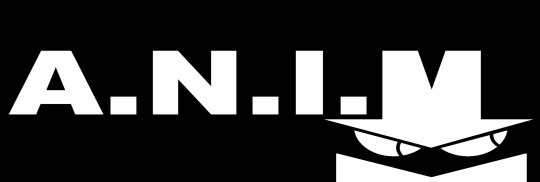
#rpg#dnd5e#dungeons and dragons 5e#ad&d#osr#ttrpg#tabletop#ttrpg tumblr#indie ttrpg#ttrpg community#ttrpgs#ttrpg design#rpgs#urban fantasy#dm advice#gm advice#game master#dungeon master#dungeons & dragons#dungons and dragons#eureka#eureka: investigative urban fantasy
140 notes
·
View notes
Text
i know a lot of people talk about the Cupid Scene as not being great as Nico's coming out story (which i think is a complex matter but that's a rant for another day), but I personally find it way more compelling if it's just not Nico's coming out story at all - it's the beginning of Jason's.
Because it doesn't really work or make sense to be Nico's, right? It's not Nico's pov. Nico doesn't have a POV at all in this book. And in House of Hades, the Cupid Scene is one of the first major things Nico gets to do right out of the box jar. Why introduce a character, have him be outed as gay, lead the crew around, and then leave to go travel with someone else all in one book where he's not even a POV? It's also contrary to the way Nico generally functions as a character - he's either exposition, dues ex machina, or damsel in distress. He's kind of a damsel here, but ultimately he doesn't need anyone else to save him - or even be there. He handles it on his own. Jason is mostly just a witness.
But, if you view the Cupid Scene as being about Jason, it narratively fits a lot more; Jason at this point is dating Piper, and they're three books deep into their relationship. TLH they start dating and are relatively happy with it and where they are. SoN is a skip but we know they're happily dating during that time, and then Mark of Athena we get a slight shift. Jason and Piper see Percy and Annabeth and go "Oh! They're perfect. Their relationship is perfect. We could be happier if we were more like them." Piper and Jason are also both characters who go through an identity turmoil in general - particularly about how both of them want to be perceived by others and who they are as people. The things they identify with - their parents, their heritages, etc etc. Their orientations. Piper's get more focus earlier in HoO, and Jason gets more later.
The Cupid Scene is from Jason's POV, in a book where he is beginning to struggle with his identity and what people expect from him - particularly him not feeling like he perfectly fits with "either camp." He's too "Greek" to be "Roman" but too "Roman" to be "Greek." He's not quite one or the other. He doesn't meet the expectations either has for him. (This is bi-coding, if you couldn't tell. Just replace "Greek" and "Roman" with "Straight" and "Gay.") It starts with Cupid addressing Jason first, before Nico, very directly - asking him if he's so sure he's happy in his relationship? Does he really think it's perfect? Even Favonius very pointedly asks him if he really forget that guys can date guys? Do you have some internalized bias around that, Jason? Hm? Heck, they're both specifically in their Roman forms, not Greek. Why would they appear in their Roman forms if they're there for a Greek demigod? And very notably, they have this exchange:
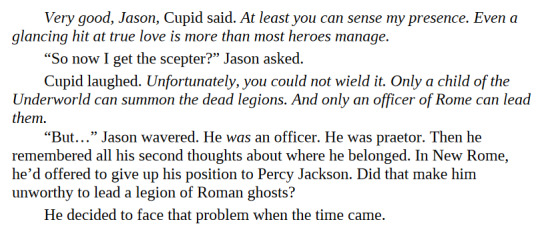
(remember what I said about the bi-coding with Jason's Greek/Roman identity crisis? I don't think it's coincidence that this so pointedly comes up during the Cupid scene.)
Favonius' introduction to the Cupid scene sets up Nico's portion of it, but Cupid almost exclusively speaks to Jason for the first half of it. Then Nico steps in. He diverts the conversation away from Jason and focuses the attention onto him. Nico's the one Cupid wants, he insists, not Jason. He's the target, not Jason. This is very in line with Nico's character - practically one of his core character traits is he trusts and starts caring about people very quickly, probably quicker than he should or even wants to, and will put himself in harm's way to prevent others from being hurt. The Cupid Scene isn't the start of Nico's coming out story - Nico already knows he's gay. He has no internal doubts about that. He's known it for awhile. He's just in the closet. And he starts coming out of his own free will in the next book, first to Reyna and Coach. The Cupid Scene is Nico recognizing that Favonius and Cupid are pushing Jason for something he's not ready for and hasn't figured out yet, but something Nico has and just hasn't said out loud yet. The Cupid Scene is Nico taking the proverbial bullet/literal arrow for Jason (Jason consistently describes the arrows as whizzing by him before striking near Nico, interestingly) and being outed so Jason isn't. And that presents Jason with the path to begin questioning his identity further. (Jason also then directly compares Cupid to Aphrodite, specifically her Greek form, which also ties into Jason's greek/roman stuff.)
And I don't think it's coincidence that Jason and Nico mirror each other so much, and that their arcs in HoH are so intertwined. The Cupid Scene functionally, on a meta level, establishes an explicitly queer character to parallel Jason and for him to bounce off of during his own arc. (And, also on a meta level, establishes to the audience to be sympathetic to queer struggles, with Jason's arc then proceeding to be a queer-coded struggle.) Jason is presented as having this strange level of isolation from how others perceive him in a positive way/the expectations people have of him that wraps around to something akin to Nico's ostracization as being an outsider and atypical demigod in general. Nico is a rouge - he explicitly expresses how he feels like he doesn't fit in at either camp (something he expresses explicitly during the Cupid Scene, mirroring Jason's simultaneous questioning his own place at Camp Jupiter) and a core part of his character is that he does function outside the rules and expectations of both camps. He operates on an entirely different realm to them. If the camps are an expectation of normative concepts of acceptable relationships, Nico is outside of that. And he recognizes that he operates outside of that and will never fully fit into the mold either expect of him, and he recognizes he doesn't need to fit in, even if he theoretically could force himself to fit that mold. Jason, meanwhile, is still locked within those boundaries, and grappling with this idea of how he can exist between them.
Nico hands Jason a goblet of poison and says "how much do you trust me?" and it's Nico challenging Jason to take his own advice about trusting others about their identities, and almost immediately after that Jason gives up his praetor title to Frank. Jason's Greek/Roman arc is directly tied to Nico and the Cupid scene. BoO ends with Jason asking Nico to stay at CHB so they can hang out that summer. By TOA, we learn that Nico has started dating and is staying at CHB (is exploring the niche of expected and socially accepted relationships) while Jason has broken up with Piper and is living away from both camps (rejecting hetero/allonormative expectations), still struggling with his own identity. They functionally swap places. And that's fascinating.
Anyways i think about Jason's bi-coding a lot.
#pjo#riordanverse#jason grace#nico di angelo#hoo#heroes of olympus#meta#analysis#long post //#HAPPY PRIDE MONTH. JASON BI-CODING MINI-ESSAY BE UPON YE.
402 notes
·
View notes